Welcome to our August archive of Essential Politics, our daily feed on California government and politics news. This year’s legislative session closed out at the end of the month.
Take a look at some scenes from the legislative session captured by the L.A. Times.
Find our current news feed here.
Be sure to follow us on Twitter for more, or subscribe to our free daily newsletter and the California Politics Podcast
- Share via
Here’s a look at some of the Legislature’s most notable moments
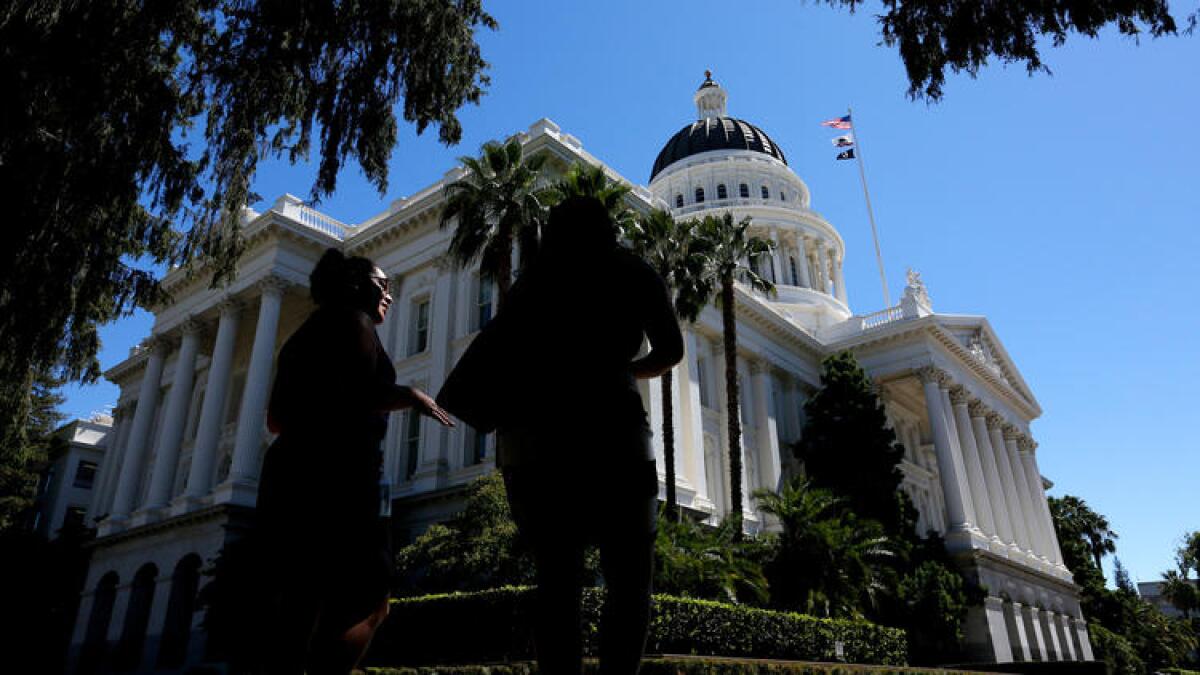
Lawmakers early Thursday morning wrapped up their work for the two-year session of the California Legislature, heaping praise on their many accomplishments.
Even so, at least one major item on the to-do list was never resolved. And some of the battles during this session could leave political scars that last much longer.
- Share via
Consumers could pay a new battery recycling fee under a bipartisan bill sent to the governor’s desk
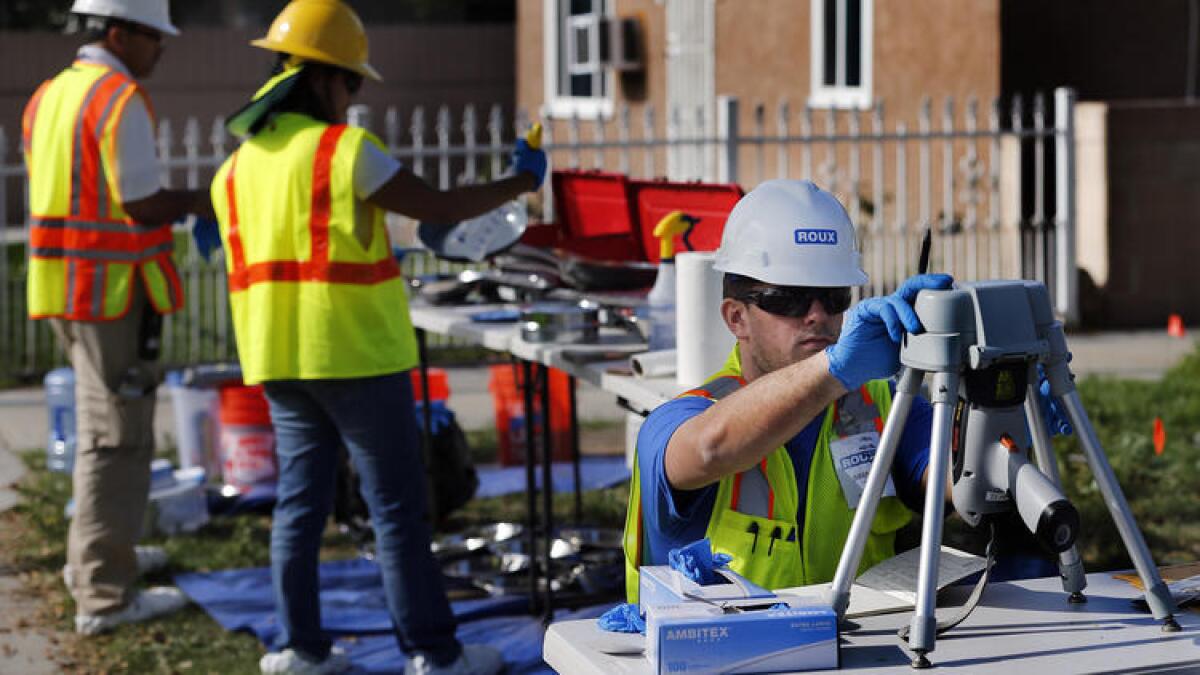
Californians who purchase lead-acid batteries like those used to start cars and trucks would pay a new $1 fee under legislation sent to Gov. Jerry Brown early Thursday morning, with the funds earmarked for cleaning up contaminated sites such as the former Exide battery plant in Los Angeles County.
The fee charged to battery buyers would rise to $2 in 2022. Lawmakers would direct the revenues — estimated to be as much as $40 million a year — to deal with contamination sites as needed.
”For four decades, our community has been waiting for something,” said Assemblywoman Cristina Garcia (D-Bell Gardens), the author of AB 2153.
The bill was the final piece of legislation taken up before the Legislature adjourned, and it received a quick bipartisan vote in both houses within a span of only a few minutes. Garcia said there were late negotiations with the Brown administration on the final details.
AB 2153, if signed into law, would not take effect until April 1, 2017. Battery manufacturers and consumers would each pay $1 fees on each new battery for the first five years of the proposal; after that, the full $2 fee would be shouldered by consumers.
Some Republican legislators said that setup is a mistake.
“This tax is regressive,” Assemblyman Travis Allen (R-Huntington Beach) said during the midnight debate. “It’s paid by the people who make the least amount of money.”
The Vernon site of the former Exide battery plant was closed under a deal with federal prosecutors last March. Lead contamination in the soil of homes around the plant was discovered two years ago. The battery fee would likely go first to Exide cleanup efforts, which are already underway. Brown estimated in February that the price tag could reach $176.6 million.
- Share via
Sorry, Internet poker fans. It won’t be legal in California anytime soon
After 10 bills over eight years failed to legalize Internet poker in California, the latest plan also died Wednesday in the Legislature amid continued squabbling by competing factions of the gambling industry.
A bill that would have allowed Californians to legally play poker online lacked support from two-thirds of Assembly members and was not brought up for a vote on the last day of the legislative session.
- Share via
The clock runs out on a major bid to overhaul the state’s energy regulator
- Share via
Effort to add members to Southern California air quality board fails
- Share via
Lawmakers say goodbye to their termed-out colleagues on the final day in Sacramento
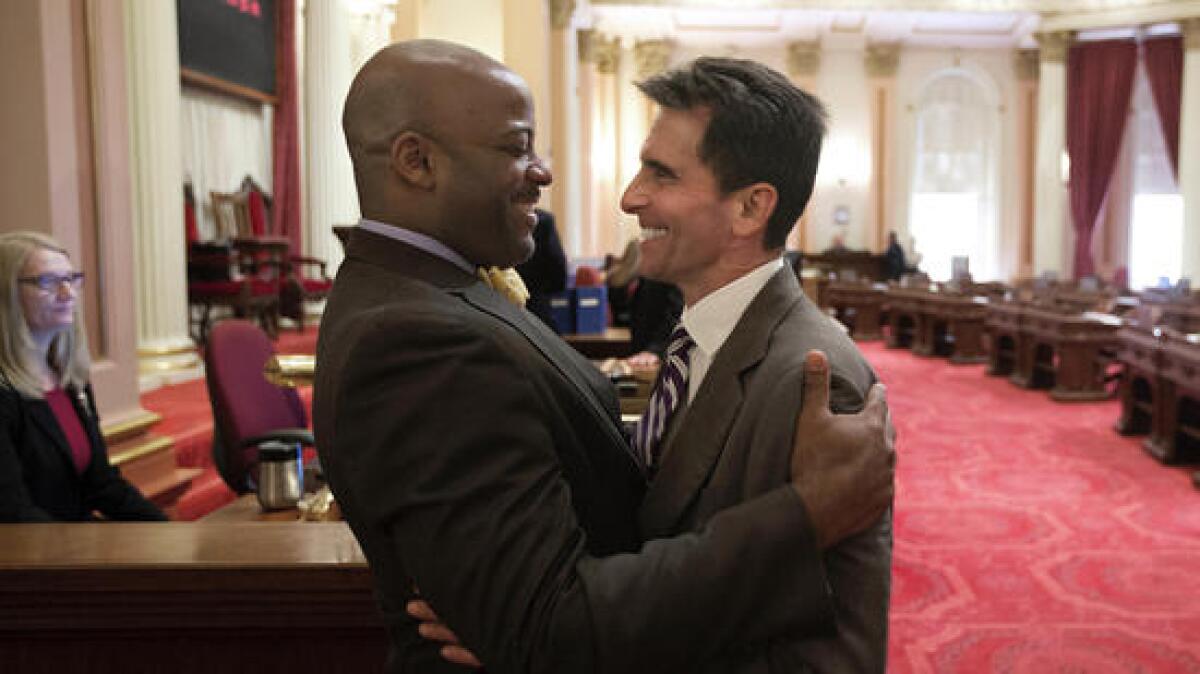
Lawmakers cried, sang, recited limericks and confessed crushes on departing colleagues this week in their farewell speeches for California legislators whose terms are up.
For 14 Assembly members and six state senators, Wednesday likely marked their last day arguing on the floors of their respective chambers. In an end-of-session tradition, lawmakers said goodbye to their termed-out colleagues between voting on bills.
Assemblyman Matt Dababneh (D-Encino) revealed he might have a legislative crush on outgoing Assemblywoman Nora Campos (D-San Jose).
“I will not miss anyone more than I will miss you,” Dababneh told Campos, who is running for state Senate this fall. “Often as a single guy, I get asked ... when are you going to find the perfect girl, and I say, ‘If I find anyone half as amazing as Nora Campos, I would be married the next day.’”
Campos, like the other members whose terms are up, served six years in the Assembly. Termed-out state senators have served eight years. Although new 12-year term limits were passed in 2012, lawmakers elected in 2010, including Campos, are still subject to the old term limits.
Assemblywoman Cheryl Brown (D-San Bernardino) sang “Katcho, Katcho Man” to the tune of “Macho Man” by the Village People while saying goodbye to Assemblyman Katcho Achadjian (R-San Luis Obispo).
Assemblyman Joaquin Arambula (D-Fresno) recited a limerick he wrote for departing Assemblyman Roger Hernández (D-West Covina) that drew chuckles for the line, “As a doctor, I’m happy your blood pressure is lower.”
Hernandez was running for U.S. Congress before allegations of domestic violence involving his ex-wife “crippled” his ability to campaign, he told reporters earlier this month. After a judge issued a domestic violence restraining order against him, he took a nearly three-week leave of absence from the Legislature for high blood pressure.
The speeches featured many bipartisan compliments for departing lawmakers.
Sen. Joel Anderson (R-Alpine) described Sen. Mark Leno (D-San Francisco) as his liberal complement in the Senate.
“This is a sad day for me. You see, Mark completes me,” Anderson said. “I’m sorry I have two more years and I won’t be spending them here with you.”
Assemblyman Richard Gordon (D-Menlo Park) wiped away tears as fellow Assemblyman Brian Jones (R-Santee) thanked him.
“If I have been able to have any effect across the aisle, it’s because of your grace and your compassion,” Jones said. “If I had the opportunity to give back my six years so you could have six more, I would do it in a heartbeat.”
- Share via
California workers won’t be getting double pay for Thanksgiving Day duty

State lawmakers defeated a measure late Wednesday that would have given retail and grocery store employees who work on Thanksgiving double pay.
Assemblywoman Lorena Gonzalez (D-San Diego), the bill’s author, said it was needed as more and more retailers were extending Black Friday sales into Thanksgiving Day.
“I narrowed and narrowed and narrowed this bill so it only affects the things that concern us the most: the larger retailers who continue to open up on Thanksgiving rather than allowing people to stay home with their families,” Gonzalez said.
No opponents to the measure spoke on the Assembly floor, but numerous business groups, including the California Chamber of Commerce, were against it. They argued the bill unfairly hurts big-box retailers that are competing with online outlets for sales. The measure fell 10 votes short of passage, with both Republicans and Democrats in opposition.
A similar bill from Gonzalez failed last year.
- Share via
Bill to advance California’s high-speed rail project is sent to Gov. Brown
In the last few hours before the end of session, lawmakers passed a measure to advance the California bullet train project.
Voters approved nearly $10 billion in bonds for the high-speed rail project in 2008, but it has since stalled. The bill passed Wednesday would clarify wording in the 2008 measure and allow some of the money for the project to upgrade existing rail lines.
“It’s a critical investment in our infrastructure,” the bill’s author, Assemblyman Kevin Mullin (D-South San Francisco), said.
But opponents say the bill passed Wednesday alters the voter-approved measure too much.
“This is a revision of what the voters intended,” Assemblyman Jim Patterson (R-Fresno) said.
The bill, AB 1889, now heads to the governor for approval.
- Share via
An overhaul of California’s taxi regulations passes the Legislature
In potentially a major change to California’s taxi business, state lawmakers passed legislation late Wednesday to centralize control over the industry, an effort supporters said would allow cabs to better compete with Uber, Lyft and other ride-hailing services.
The bill, AB 650, would prohibit local governments from setting taxi rates or limit the number of taxis on the road as well as allowing cabs to pick up and drop off passengers outside specific local jurisdictions. Ride-hailing companies have looser regulations in those areas and have made significant inroads into the taxi business.
“The laws and regulations governing the provisions of transportation services are many decades old and have evolved slowly,” said the bill’s author, Assemblyman Evan Low (D-Campbell). “As with many new technologies, the rapid growth of [ride-hailing] companies has created a disruption in taxis’ archaic model of transportation.”
Under the bill, the taxi industry would be regulated by state departments that handle transportation. The measure exempts San Francisco, which backers of the measure described as having a unique taxi medallion system. AB 650 would take effect as soon as next year, once Gov. Jerry Brown finishes a reorganization of transportation departments.
The bill has caused significant consternation among local governments and within the taxi industry. Last week, the city of Los Angeles voted to oppose the measure unless it was also exempted. Since that vote, Low changed the legislation to accommodate some of the largest objections. Cities will still be allowed to force taxis to pick up in every neighborhood to prevent discrimination and require taxis to accommodate people with disabilities.
Some lawmakers opposed to the bill argued on the Assembly floor that it was rushed.
Assemblywoman Lorena Gonzalez (D-San Diego) also contended that the measure lowered worker protections for taxi drivers in an effort to increase competition with ride-hailing companies.
“Those are such terrible jobs with such few regulations that protect workers that to say the answer to the [ride-hailing] problem, and there is a problem in the sharing economy, is to say, ‘Let’s just forget regulations?’” Gonzalez said. “That may be somebody’s answer, but that’s not mine.”
The bill now heads to Brown’s desk.
Times staff writer Laura J. Nelson contributed to this report.
- Share via
The clock is ticking towards midnight in the Assembly
- Share via
A $3.5-billion statewide parks bond will not go forward this year
- Share via
After facing long odds, $3 billion low-income housing bond is done for the year
A $3 billion low-income housing bond is done for the year.
The measure, which would have put a ballot measure authorizing the bond before voters in 2018, was aimed at helping relieve the state’s huge housing supply deficit, especially for California’s poorest residents. The bill, authored by state Sen. Jim Beall (D-San Jose), didn’t come up for a vote in the Assembly. It faced long odds, needing a bipartisan vote there and then the signature of Gov. Jerry Brown, who had already expressed his opposition.
- Share via
After a rocky final few months, Roger Hernández quietly finishes his legislative career
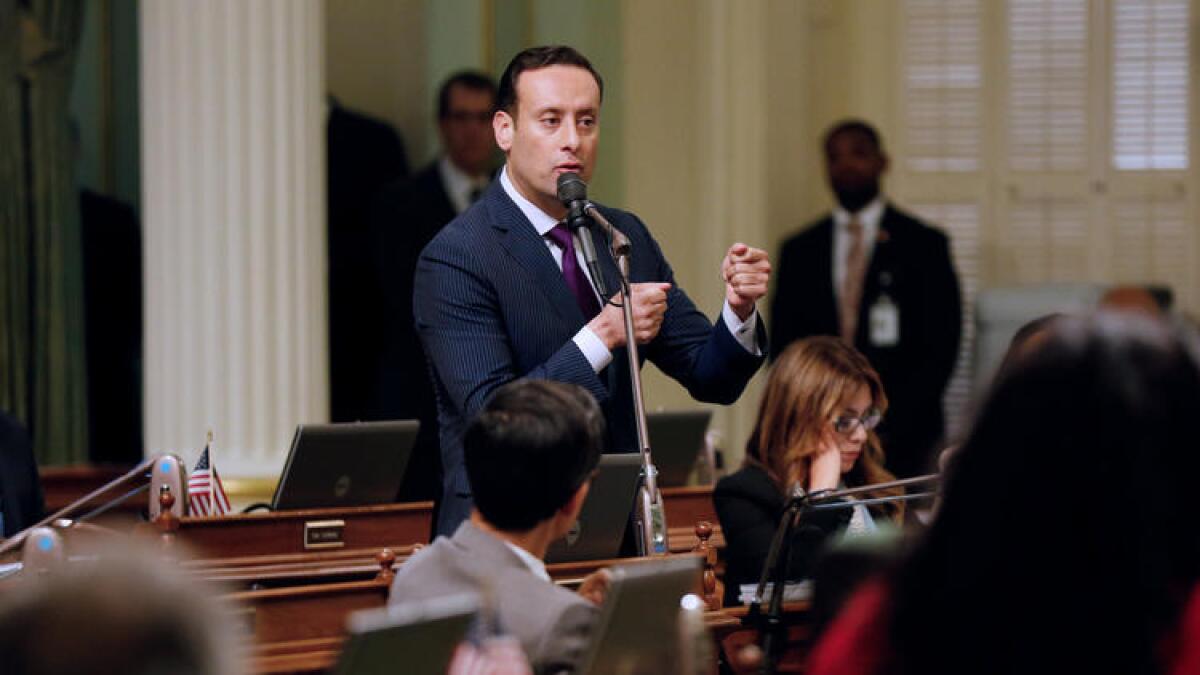
A number of politicians wrapped their legislative careers on Wednesday as the Legislature adjourned for the year, but few face as much uncertainty in the months to come as Assemblyman Roger Hernández.
The West Covina Democrat spent much of the final day of the 2016 legislative session sitting quietly at his desk after returning to Sacramento last week in the wake of a domestic violence restraining order in July. Hernández was then excused on medical leave for the first few days of the August proceedings.
In a final farewell speech in the Assembly on Wednesday afternoon, the lawmaker briefly reflected on some 17 years in local and state public service.
“I leave this floor with great joy and some sadness because I love this job,” Hernández said. “This is my favorite job I’ve ever had.”
In the final legislative hours, Hernández also sought to explain his decision as a committee chairman this summer to kill a closely watched bill to expand the state’s parental leave law — only to then vote for the proposal once it was resurrected by its author, state Sen. Hannah-Beth Jackson (D-Santa Barbara). In a post on his Facebook page, he said the earlier action was because of the original bill’s impact on small businesses.
“I believe the impact on small businesses has been taken into greater consideration in today’s bill,” he wrote on Tuesday.
Hernández recently said that he no longer feels he can mount a campaign for Congress against Rep. Grace Napolitano (D-Norwalk).
The lawmaker left his Assembly colleagues with some advice in his farewell speech.
“There are so many people that are depending on each and every one of us to fight ardently for them.” he said. “You are their champion. Don’t forget that please.”
- Share via
Planned Parenthood-inspired bill to crack down on secret recordings clears Legislature
It’s already illegal to record someone without their permission in California; under a bill that got final legislative approval on Wednesday, distributing such a recording could lead to even more legal trouble.
The bill by Assemblyman Jimmy Gomez (D-Echo Park) would make it illegal to distribute secret recordings involving a healthcare provider. The measure was inspired by the high-profile videos taken by anti-abortion activists that purported to show Planned Parenthood doctors and employees engaged in illegal sale of fetal tissue. Planned Parenthood was not charged with any wrongdoing, and the organization argued the videos were doctored.
The bill, AB 1671, represents a compromise between Planned Parenthood and media organizations, which were wary that the proposed crime could ensnare journalists.
But approval from Gov. Jerry Brown is not a sure thing; the bill creates a new crime and the governor has rebuffed other efforts to add to the penal code.
- Share via
Lawmakers approve new climate plans to help California’s disadvantaged communities

Three more measures intended to address climate change in poor and polluted communities were passed by state lawmakers Wednesday night.
They followed on the heels of major legislation approved last week to set a new target for reducing greenhouse gas emissions and to increase oversight of state regulators.
One of the bills, AB 1550 from Assemblyman Jimmy Gomez (D-Echo Park), would refine guidelines for spending revenues from the state’s auction of greenhouse gas pollution credits and would require more money be used to help low-income households.
Gomez said the bill would bring greater equity to the state’s programs.
“Our most polluted neighborhoods are disproportionately home to Latinos, African Americans and other communities of color,” he said.
AB 2722 from Assemblywoman Autumn Burke (D-Marina del Rey) would ensure more state grants awarded through a housing program would go toward disadvantaged communities.
A third measure, SB 1383 from state Sen. Ricardo Lara (D-Bell Gardens), would direct state regulators to crack down on “short-lived climate pollutants,” which include emissions that contribute to global warming and create health hazards.
Gov. Jerry Brown’s office has signaled that he supports all of the proposals.
- Share via
Lawmakers and Capitol staff, tired as long and final day dragged on, vented on Twitter
- Share via
Technical difficulties in California’s Capitol
On the last night of the legislative session, the state Senate is going “old school,” said the chief of staff for Senate leader Kevin de León.
- Share via
Is this the last time a legislative session ends in Sacramento with quickly amended bills?
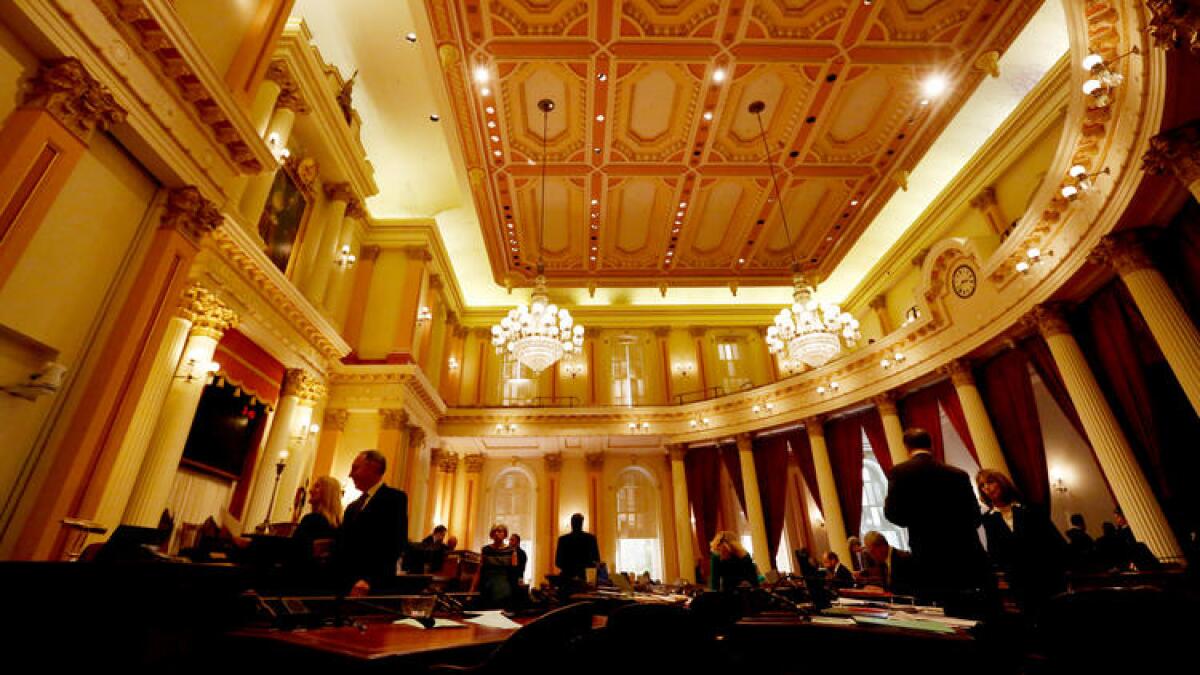
At several points Wednesday night, with only hours before the end of the legislative session, proposed laws were being quickly rewritten and placed in front of weary lawmakers for a fast vote.
It’s a familiar scene at the state Capitol. But one group hopes it’s also the last time it happens.
Proposition 54, which will be considered by California voters on Nov. 8, would require most bills be in print and online for public review for at least 72 hours before final legislative votes.
That would almost completely eliminate a number of bills debated and passed Wednesday, usually brought up “without reference to file.”
The idea behind Proposition 54, written by Republican donor Charles Munger Jr. and former legislator Sam Blakeslee, actually originated in the Legislature. The two men circulated their initiative after the Legislature failed for several years to move the idea forward.
- Share via
$900-million cap-and-trade spending plan gets OK in both houses
- Share via
‘Let’s get the Olympics back to California’: Lawmakers OK $250-million spending guarantee for 2024 Summer Games
State lawmakers on Wednesday sent the governor a bill that would allow him to provide up to $250 million in financial guarantees in case the city of Los Angeles goes over budget in its proposal to host the 2024 Summer Olympic Games and Paralympic Games.
Senate President Pro Tem Kevin De Leon (D-Los Angeles) said the authorization is needed to allow the city of Los Angeles to compete to host the Games, which he said are not expected to show a deficit.
“Let’s get the Olympics back to California,” De Leon told his Senate colleagues before they voted to approve the bill. The guarantee is required by the U.S. Olympic Committee and the International Olympic Committee as a prerequisite before any city can be considered for hosting an Olympic Games.
“Hosting the Games in California is expected to generate billions of dollars for the state’s economy,” stated De Leon’s bill giving authorization to the governor. “The city of Los Angeles expects there will be net revenue exceeding expenses that can be devoted to legacy programs for youth and citizens of California.”
- Share via
New processing standards for medical marijuana would be set under bill sent to governor
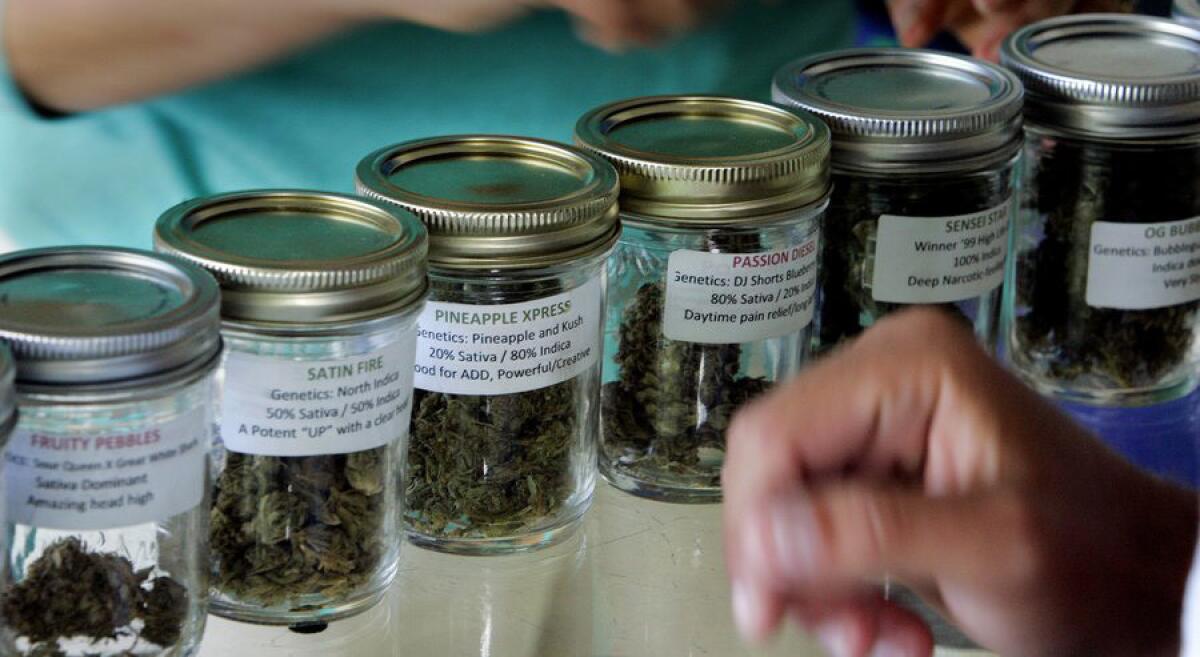
The University of California would conduct a study of the effects of marijuana on motor skills, and new standards would be set for manufacturing medical cannabis products under legislation sent Wednesday by state lawmakers to the governor.
The measure was approved as California prepares to begin issuing licenses to marijuana growers and sellers in 2018 and as voters consider a November ballot measure that would legalize recreational use of pot.
The bill by Assemblyman Ken Cooley (D-Rancho Cordova) and others would exempt collectives and cooperatives that manufacture medical cannabis products from some criminal sanctions if they meet state requirements. The manufacturing must use processes without solvents or processes with nonflammable, nontoxic solvents.
“Recent raids and busts on the ground have highlighted the need for this bill,” said Assemblyman Rob Bonta (D-Oakland), a co-author of the bill.
Cooley said the new manufacturing standards can be enforced by the new Bureau of Medical Cannabis Regulation.
“As the bureau ramps up licensure programs and puts regulations in place, it is important that local governments have clarification about what types of manufacturing and extraction are allowed,” Cooley said.
The measure, which also provides for reporting of license denials, is supported by the California Cannabis Industry Assn., which said it will protect the health and safety of medical cannabis patients.
The study on pot’s effect on motor skills comes as groups opposing recreational use charge that legalization will lead to more automobile accidents in California.
- Share via
Overhaul of the state’s electricity regulator continues to move forward
- Share via
Capitol cracks down on traditional penny toss
Every year at the end of the legislative session, lobbyists and staff members gather on the second floor of the Capitol rotunda and toss pennies off the balcony. If they land a coin in the crown of the statue below, it’s supposed to bring good luck.
Here’s a video of the ritual from 2014.
But some blamed the penny tossing for damage to the statue of Queen Isabella and Christopher Columbus. And with another legislative session ending on Wednesday, officials took steps to cut off the ritual before it began.
- Share via
Yes, in your backyard: Legislature OKs easing restrictions on building ‘granny flats’ in California
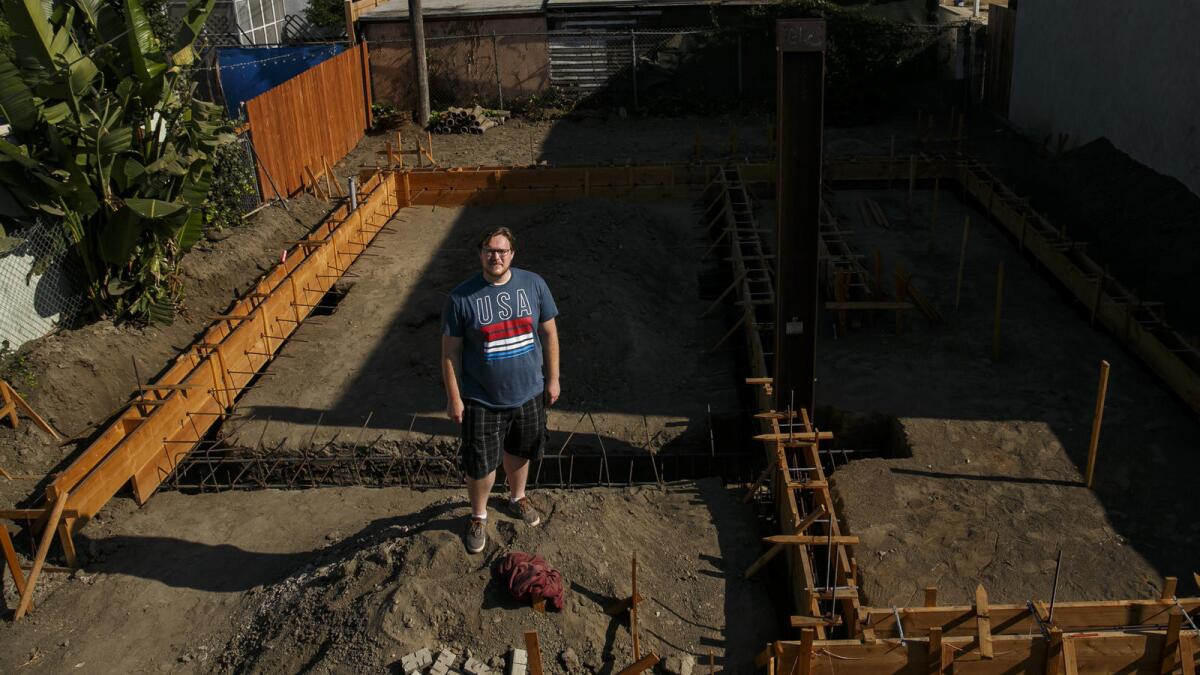
It might soon be easier for California homeowners to convert garages into new residences or build additional freestanding structures in their backyards, after lawmakers approved a measure to streamline restrictions on the units statewide.
This week, the Legislature approved two measures, SB 1069 from Sen. Bob Wieckowski (D-Fremont) and AB 2299 from Assemblyman Richard Bloom (D-Santa Monica) aimed at forcing local governments to approve the secondary housing units, often known as “granny flats.”
“People are shocked and frustrated when they see the enormous fees and requirements that are preventing them from adding a small unit or converting a room in their house,” Wieckowski said in a statement. “SB 1069 will eliminate unnecessary fees and reduce requirements to give homeowners more control over their home.”
Under the two bills, local governments will no longer be able to require homeowners to add parking for new granny flats near transit stops or have a large uncovered pathway to the street, and will limit fees for connecting the additional unit to water and sewer lines.
State lawmakers who have tried to encourage building such units for more than a decade as a way to address California’s soaring housing costs have expressed frustration with local government inaction.
In Los Angeles, for example, all granny flat permitting is on hold after a Superior Court ruling earlier this year found a conflict between local rules and state law. City officials have tried to resolve the issue recently, but are facing opposition from homeowners who argue that the units would hurt the character of neighborhoods.
Gov. Jerry Brown endorsed both measures earlier this year, and is expected to sign them.
UPDATE
Aug. 31, 4:22 p.m. This post was updated after AB 2299 passed the Legislature.
This was originally posted on Aug. 30 at 7:04 p.m.
- Share via
Wear your jean jacket proudly. Legislature makes denim California’s official fabric
It’s official.
The California Legislature has declared denim the state’s official fabric.
Assemblyman Marc Levine (D-Marin County) presented the wryly named AB 501, while his colleagues displayed jean jackets and joked whether Jordache jeans would be included.
“AB 501 tells both the story of California and global culture,” Levine said.
Levine easily overcame the opposition.
The bill passed 59-3. Gov. Jerry Brown hasn’t weighed in yet.
- Share via
More incentives for developers to build low-income housing heads to the governor’s desk
- Share via
Uber and Lyft drivers could soon face tougher background checks, thanks to bill headed to Gov. Jerry Brown
Drivers for Uber, Lyft and other ride-hailing services could soon face stricter background checks under a measure that passed the California Legislature on Wednesday.
The bill would prohibit the companies from hiring drivers who are registered sex offenders, have been convicted of violent felonies or, within the last seven years, have a driving-under-the-influence conviction.
The bill’s author, Assemblyman Jim Cooper (D-Elk Grove), said the measure “will help ensure the safety of passengers utilizing [ride-hailing] services.” He noted that prosecutors in Los Angeles and San Francisco last year found 25 people with lengthy criminal histories driving for Uber.
But Assemblyman Bill Quirk (D-Hayward) argued that the measure is too strict and hurts the ability of those with long-ago convictions to find jobs.
“The language in the bill doesn’t take into consideration individuals who committed crimes 10, 15 or 20 years ago, have paid their debt to society and are now model citizens,” Quirk said.
The bill also mandates a maximum $5,000 fine each time a ride-hailing company violates the background-check rules. The measure now heads to Gov. Jerry Brown’s desk.
- Share via
California lawmakers ask governor to criminalize possession of synthetic drug ‘spice’

Alarmed that dozens in Los Angeles have been sickened after ingesting a synthetic drug called “spice,” state lawmakers on Wednesday sent the governor a bill outlawing possession of the substance.
The urgency measure requested by the California Narcotics Officers Assn. would make a first offense of possession of specified synthetic cannabinoids or stimulants an infraction. A second or third offense could be a misdemeanor. It is already a crime to sell the drugs.
Sen. Cathleen Galgiani (D-Stockton) cited the situation on Los Angeles’ skid row in which more than 50 people have been hospitalized in the last few weeks, many suspected of using the drug.
“These synthetic drugs are a uniquely dangerous threat to public safety,” Galgiani told her Senate colleagues before a unanimous vote to approve her bill, Senate Bill 139.
The measure’s supporters also included the Assn. for Los Angeles Deputy Sheriffs, the California Police Chiefs Assn. and the Los Angeles Police Protective League.
The measure is opposed by the American Civil Liberties Union and the Drug Policy Alliance.
- Share via
California soon could expand the state’s family leave law to smaller businesses
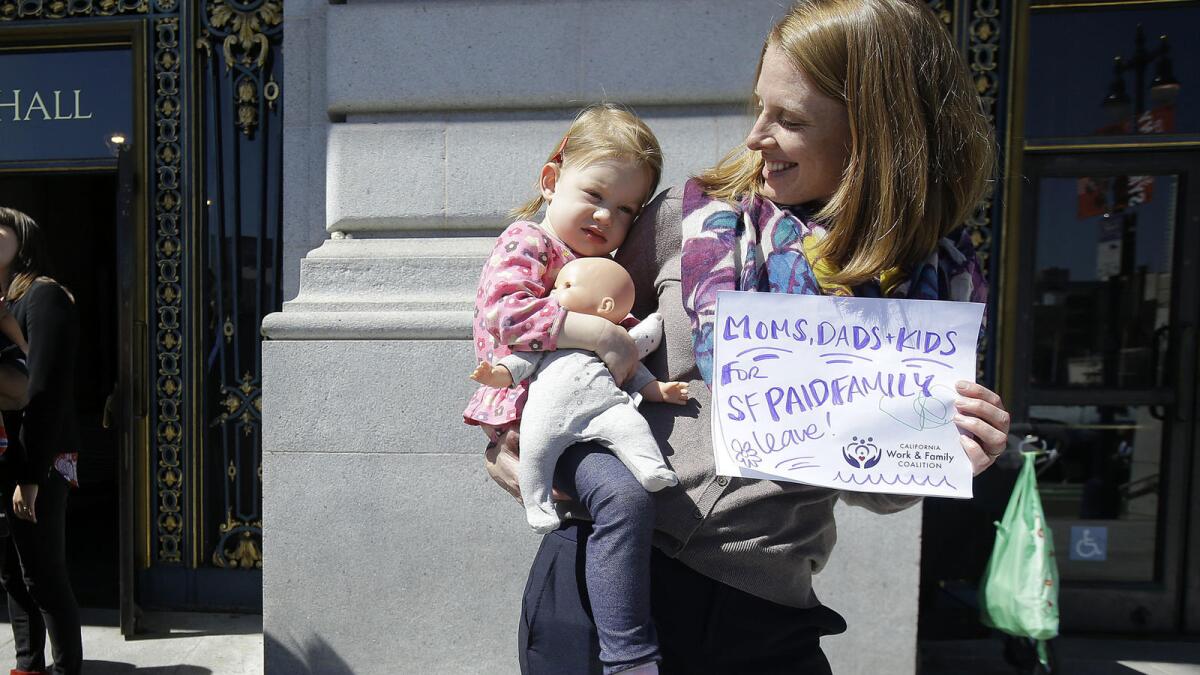
California soon could expand its family leave law to 2.7 million residents across the state, the latest of legislative efforts this session that have sought to assist working parents.
SB 654, dubbed the New Parent Leave Act, is headed to the governor’s desk after it passed out of the state Senate on Wednesday with a 24-12 vote.
The bill would allow parents at smaller companies with 20 to 49 employees to take six weeks’ leave to care for a newborn or newly adopted child, without fear of losing their jobs. Current state law extends only such job protection to those at businesses with 50 or more employees.
The legislation also would allow parents to access the state’s Paid Family Leave Program, which provides up to six weeks of partial wages for some caregiving responsibilities.
Supporters of the bill said it closes a loophole in the state’s family leave law for many employees who already pay for the leave program through payroll deductions and are not eligible for its benefits. But the legislation has faced major opposition from the business community, which has labeled it a job killer, saying it would overwhelm small companies.
On the Senate floor Wednesday, Sen. Jeff Stone (R-Murrieta) said it would hurt small businesses already struggling to meet new minimum wage requirements signed into law this year.
Sen. Hannah-Beth Jackson (D-Santa Barbara) argued her bill would impact only 6.3% of California companies, while helping 16% of its workforce. She said she had done everything possible to address the concerns of small businesses through amendments that narrowed the scope of the legislation.
“But we live in a different world today, colleagues,” she said. “It is a world where both men and women are working. It is a world where both men and women want the opportunity to bond with their newborns, and frankly, no parent should be forced to choose between the well-being of their new child and their family’s financial security.”
The vote Wednesday comes as momentum continues to grow for stronger family leave laws nationwide, and as some tech giants in California have rushed to amend their policies.
The state became the first in the country to guarantee workers paid leave to care for a new child or ailing family member more than 15 years ago. But two main challenges have kept many parents from taking advantage of the law: Some could not afford to take time off because of the limited partial wages offered, while others feared they would lose their jobs if they did.
Gov. Jerry Brown sought to address the first obstacle when he signed legislation earlier this year to help low-income families. That allows people earning close to minimum wage to be paid 70% of their salary while on leave, while workers with higher pay, up to $108,000 annually, will get 60% of their salary during leave. The change takes effect in 2018.
Jackson’s bill seeks to tackle the latter challenge and is a priority of the California Legislative Women’s Caucus, which the senator co-chairs. It faced trouble earlier this year when it was surprisingly killed in an Assembly committee, following friction between Jackson and Assemblyman Roger Hernández (D-West Covina). He was stripped of his committee chairmanship earlier this year after a judge granted his ex-wife a domestic violence restraining order against him
Legislative leaders in both houses have supported the measure’s revival.
- Share via
Scenes from the end of session
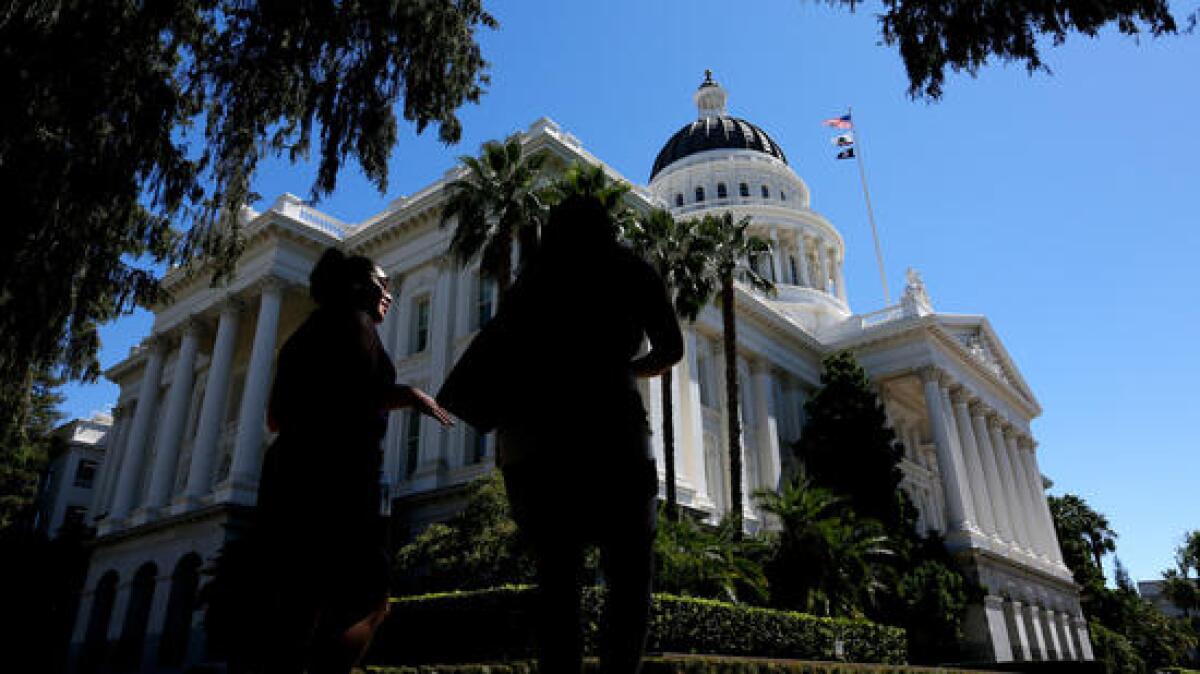
The California Legislature wraps up its two-year session Wednesday. As lawmakers debate and vote on hundreds of bills in the final few days, lobbyists and residents have swarmed the Capitol to advocate on issues ranging from energy policy to farmworker overtime pay.
Here are some images showing what it’s like in Sacramento at the close of session. Click the link to see the full gallery.
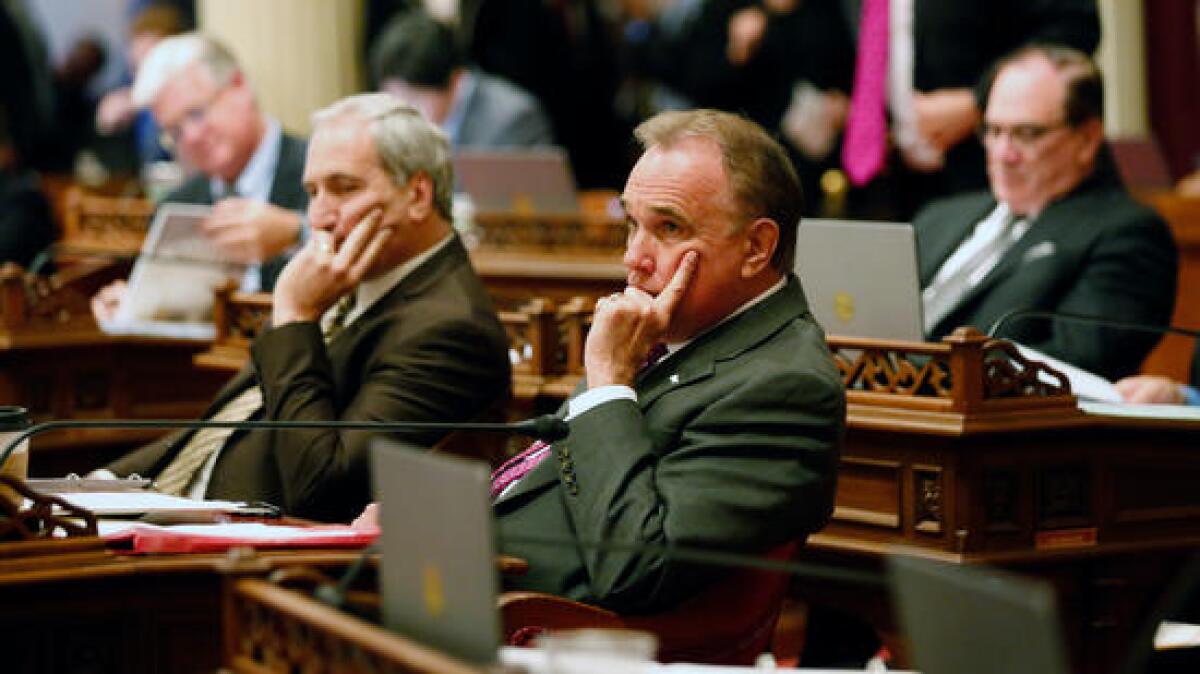
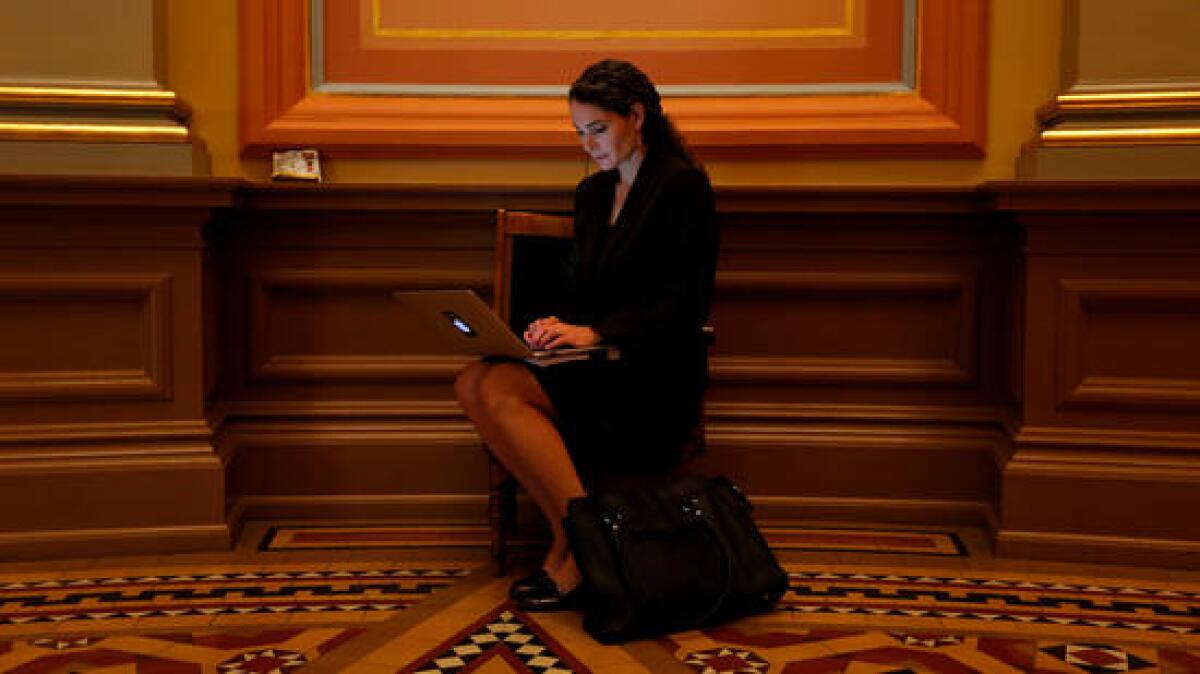
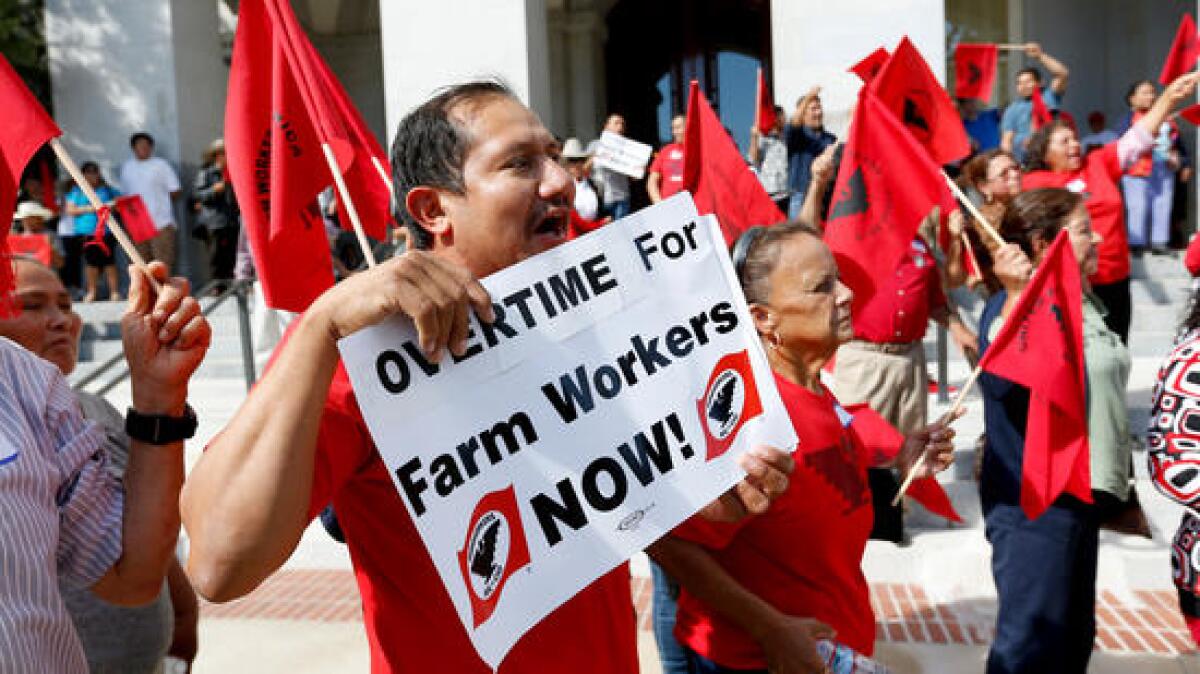
- Share via
California’s former budget director tapped to pitch in on Puerto Rico crisis
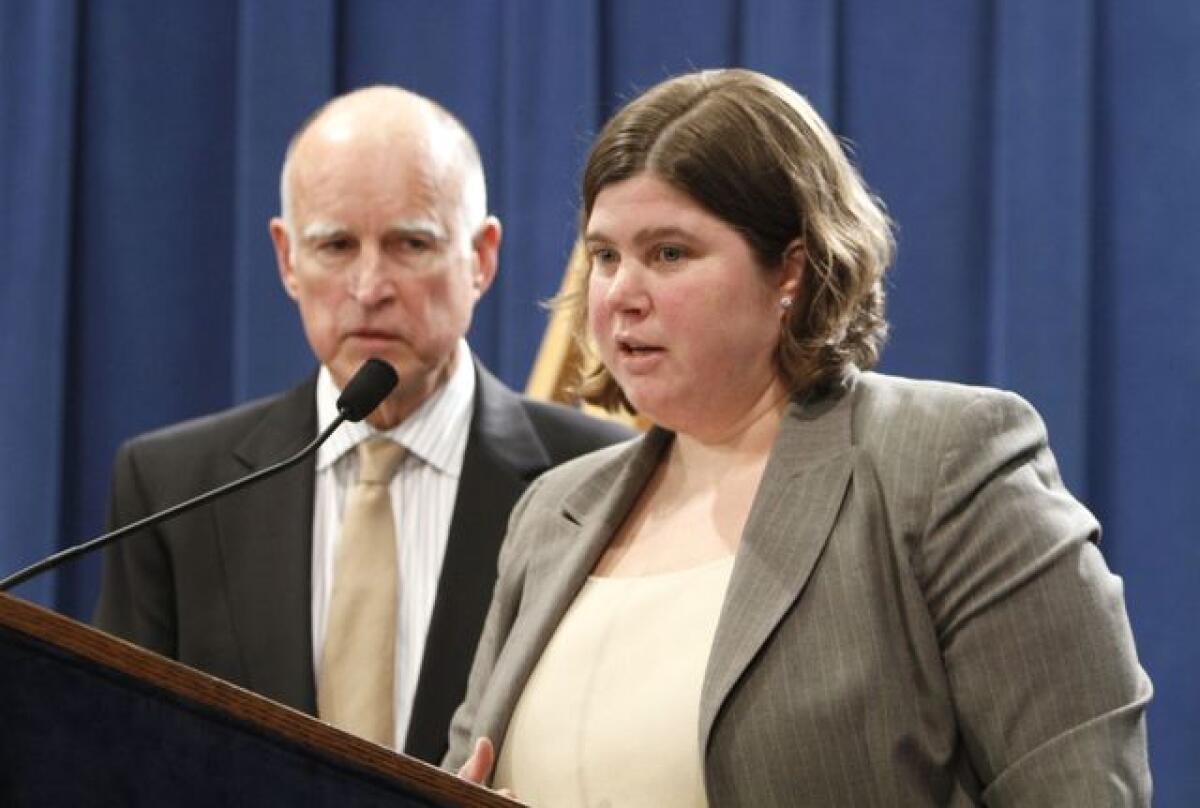
Ana Matosantos, who served two governors as budget director, was appointed Wednesday by President Obama as one of seven members of a financial oversight board to assist cash-strapped Puerto Rico.
Matosantos’ role on the Financial Oversight and Management Board for Puerto Rico, created through a new federal effort to help the U.S. territory through its fiscal crisis, will be to help create a new dialogue between the island’s government and its creditors.
Puerto Rico defaulted on a $422-million bond in May, and faces significant problems in providing basic government services.
Matosantos, 40, left Gov. Jerry Brown’s administration in 2013 and has been in private consulting roles ever since. She also served in the Arnold Schwarzenegger administration.
“With a broad range of skills and experiences, these officials have the breadth and depth of knowledge that is needed to tackle this complex challenge and put the future of the Puerto Rican people first,” Obama said in a written statement.
- Share via
Gov. Jerry Brown, state lawmakers reach last-minute deal on spending cap-and-trade revenues
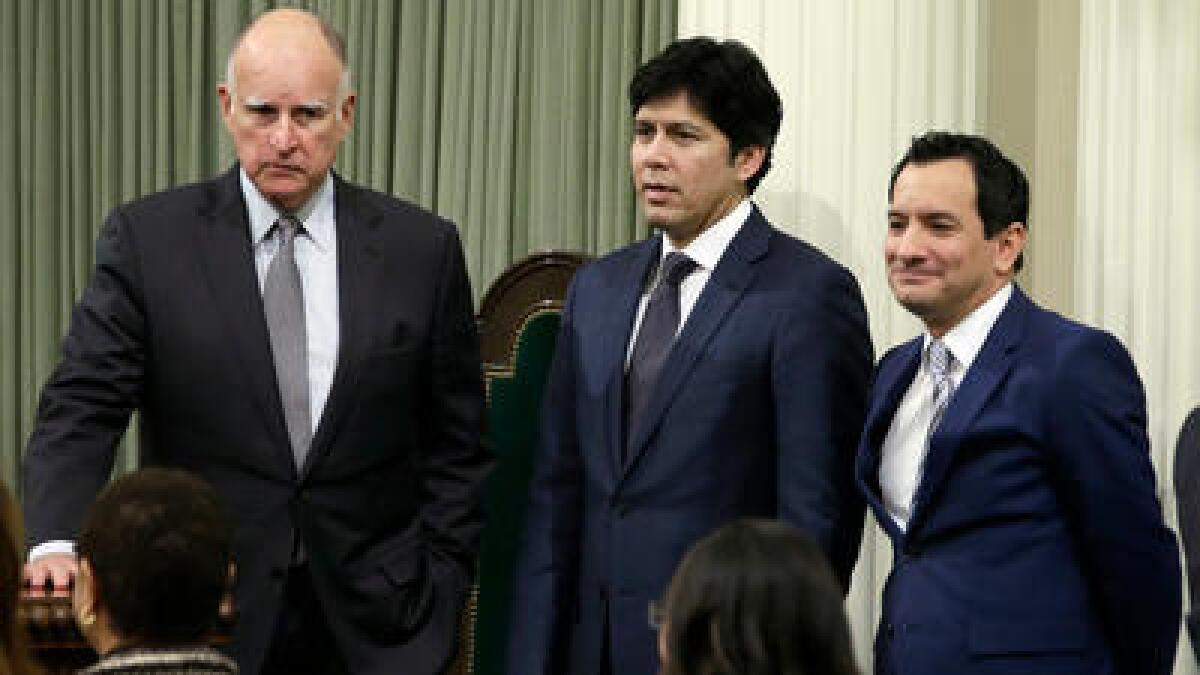
In the closing hours of the legislative year, lawmakers approved a last-minute deal Wednesday to free up hundreds of millions of dollars from the state’s cap-and-trade program to fund green projects across the state. Under the agreement, which broke a two-year impasse, the state will spend $900 million on programs to reduce greenhouse gas emissions — nearly two-thirds of $1.4 billion that has been raised but was tied up unspent in a political stalemate. The money will go toward subsidies for electric cars, new park space and pedestrian-friendly affordable housing. California’s 4-year old cap-and-trade program raises money from businesses that purchase permits to pollute.
The deal was announced on the Legislature’s final day, and was hailed by the governor and legislative leaders. It comes not long after they inked an ambitious plan to combat climate change by extending and expanding California’s targets to reduce greenhouse gas emissions.
“California’s combating climate change on all fronts and this plan gets us the most bang for the buck,” Brown said in a statement. “It directs hundreds of millions where it’s needed most – to help disadvantaged communities, curb dangerous super pollutants and cut petroleum use – while saving some for the future.”
The deal is expected to land on Gov. Jerry Brown’s desk as early as Thursday morning.
The spending proposal is tilted toward urban areas and low-income communities, marking a win for lawmakers who argued their poorer constituents were being left out of the largesse generated by the cap-and-trade program. The final deal included money for energy efficiency upgrades for aging buildings and urban parks, but no money for conservation projects such as wetlands restorations.
Such spending priorities are typically haggled over during the budget process, but for two years, the funds were trapped in political limbo, being held as leverage while politically fraught climate bills were being debated in the Legislature. Another 60% of the auction revenues are not subject to the annual budget process; instead, they are automatically directed each year toward certain projects, including the bullet train and affordable housing.
This new agreement would allocate $135 million for transit projects such as intercity and commuter rail systems.
It would spend $133 million for the state’s main subsidy program for low- and zero-emission vehicles, and another $80 million for a second subsidy for low-income Californians living in poorer parts of Los Angeles and the San Joaquin Valley.
Thousands of consumers were pushed to wait lists while the cap-and-trade funds were held in limbo. Once the budget is finalized, rebates will go out to those already on the waiting list, with priority going to low-income buyers.
It includes $80 million for urban parks and other green spaces. Such projects will be chosen by state and local agencies during a grant process over the next several years.
“The reality is we have many communities…especially in Los Angeles, that are urban asphalt and concrete wastelands,” said Senate leader Kevin de León (D-Los Angeles). He said urban greenery—which can be as small as an alleyway or pocket park — help combat high temperatures caused by vast stretches of asphalt and concrete, leading to lower cooling costs.
The plan allocates $140 million to assist disadvantaged communities to develop their own local efforts to combat climate change, such as city planning that includes affordable housing and pedestrian walkways.
Multiple bills expected to pass in the Legislature late Wednesday add new restrictions on how the money is spent. About half of those who had received subsidies to purchase low- or zero-emission vehicles were earning more than $200,000 a year, according to a state survey. A new bill would limit the subsidy to those making less than $150,000.
Similarly, the spending package includes $50 million to reduce methane emissions from dairy and livestock dependent on a separate bill that would require sharp cuts in these emissions by 2030.
And a third bill creates a new program that encourages disadvantaged communities to develop their own local efforts to combat climate change, such as such as city planning that includes affordable housing and pedestrian walkways. The legislation includes $140 million to fund this effort statewide.
The spending plan is not as expansive as the one proposed by De León earlier this month, which sought to spend $1.2 billion.
Assembly Speaker Anthony Rendon (D-Paramount) had expressed reservations about using nearly all of the available cash in light of dwindling proceeds from recent cap-and-trade auctions.
Facing legal uncertainty due to a pending lawsuit, cap-and-trade auction revenue has sharply declined. The most recent auction, held in August, generated around $8 million. Lawmakers said they hoped the recent extension of the state’s emissions targets — which demonstrated a political will to shore up the program — would restore faith from the markets.
“With this agreement, we take an aggressive approach to investing cap-and-trade funds that provides tangible results for cleaner air and helps lower income Californians benefit from emission reduction programs,” Rendon said in a statement. “At the same time, we are also maintaining a responsible reserve to provide for the future.”
Brown, who has championed setting aside money in the case of economic downturn, appeared even less inclined to dip into cap-and-trade dollars. Asked last week if he backed spending those funds, the governor said he was “committed to spending a little of that money,” placing emphasis on the word “little.”
This post was updated at 12:25 p.m. to include comments from the governor and legislative leaders and again at 11 p.m. to provide more details and context. It was originally published at 11:45 a.m.
- Share via
White House promises more federal aid for Lake Tahoe region
The White House on Wednesday announced a series of new funding and environmental programs to address the deteriorating health of Lake Tahoe and the surrounding forests caused in part by the increasing temperatures brought about by climate change.
The announcement came just hours before President Obama was scheduled to address the Lake Tahoe Summit, an annual environmental conference that California and Nevada leaders began two decades ago because of concerns about the declining water clarity in the once crystal-clear Sierra lake.
Tahoe’s surface water temperature in 2015 was the highest ever recorded, while annual snowfall levels have been on the decline. The increasing air temperatures in the Lake Tahoe region also have stressed the surrounding forests, causing an alarming increase in tree mortality and fire danger, according to the UC Davis Tahoe Environmental Research Center.
In response, the Obama administration announced the following assistance:
- The Department of the Interior will provide $29.5 million to reduce dead trees and other hazardous fuels to improve forest health and decrease the threat of catastrophic wildfires.
- The Environmental Protection Agency will provide $230,000 to manage and reduce storm water runoff in the Tahoe region.
- The National Forest Foundation, working with the U.S. Forest Service and local communities, announced it has raised over $4 million for creek restoration projects, for sustainable recreation and to improve forest health throughout the nearby Truckee River watershed.
Along with assistance for the Lake Tahoe region, the White House also announced a new partnership between California and the Department of the Interior to assess the future of the Salton Sea.
- Share via
Bill allowing landlords to bar medical pot use is dropped
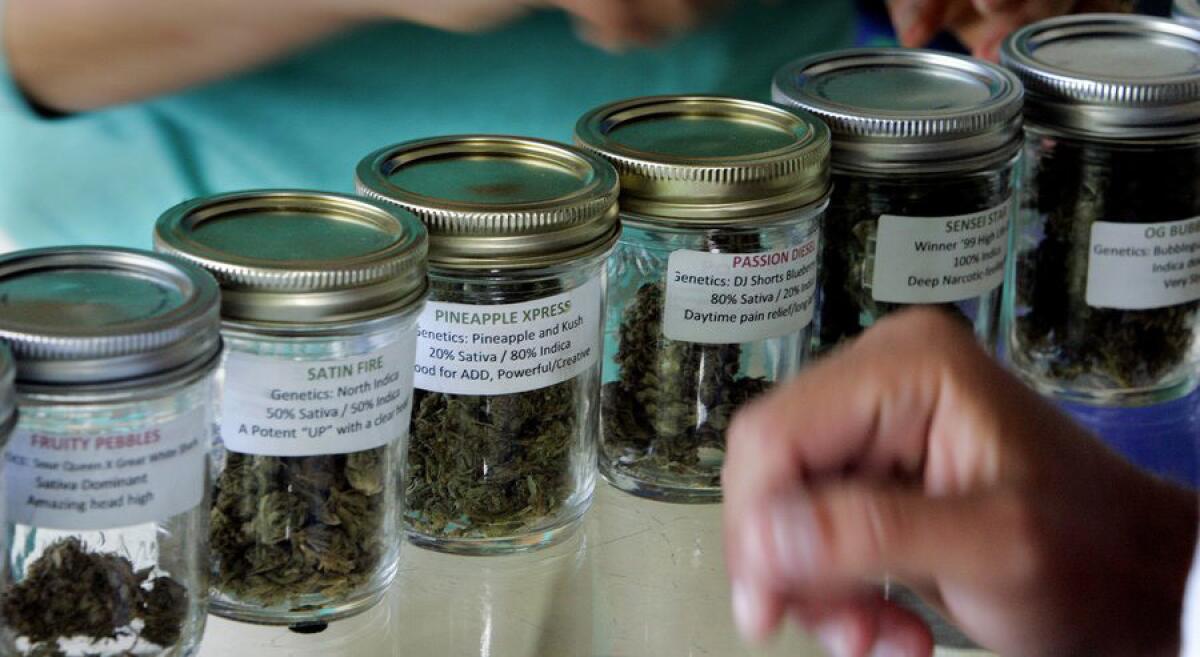
A state lawmaker has dropped a proposal that would have allowed landlords renting apartments in California to bar their tenants from smoking medical marijuana in their residences.
Assemblyman Jim Wood (D- Healdsburg) could not work out an agreement with the chairwoman of a key committee on how to meet the needs of people relying on medical cannabis, an aide said.
Wood had said AB 2300 is needed because secondhand smoke can easily travel through windows, doors and shared ventilation system in multiunit apartments and condos.
“This is about protecting families that live in close proximity to others,” Wood said in a recent statement, adding that there are cannabis products that can be ingested without smoking them.
However, Sen. Hannah-Beth Jackson (D-Santa Barbara), who chairs the Senate Judiciary Committee, thought the bill was too limiting on medical cannabis patients.
“They had a difference of opinion regarding the effectiveness of cannabis delivery mechanisms other than smoking,” said Liz Snow, a spokeswoman for Wood, who said the assemblyman agreed to drop the bill in lieu of Jackson’s continuing concerns.
- Share via
In the wake of allegations against Bill Cosby, California may end statute of limitations for prosecuting rape
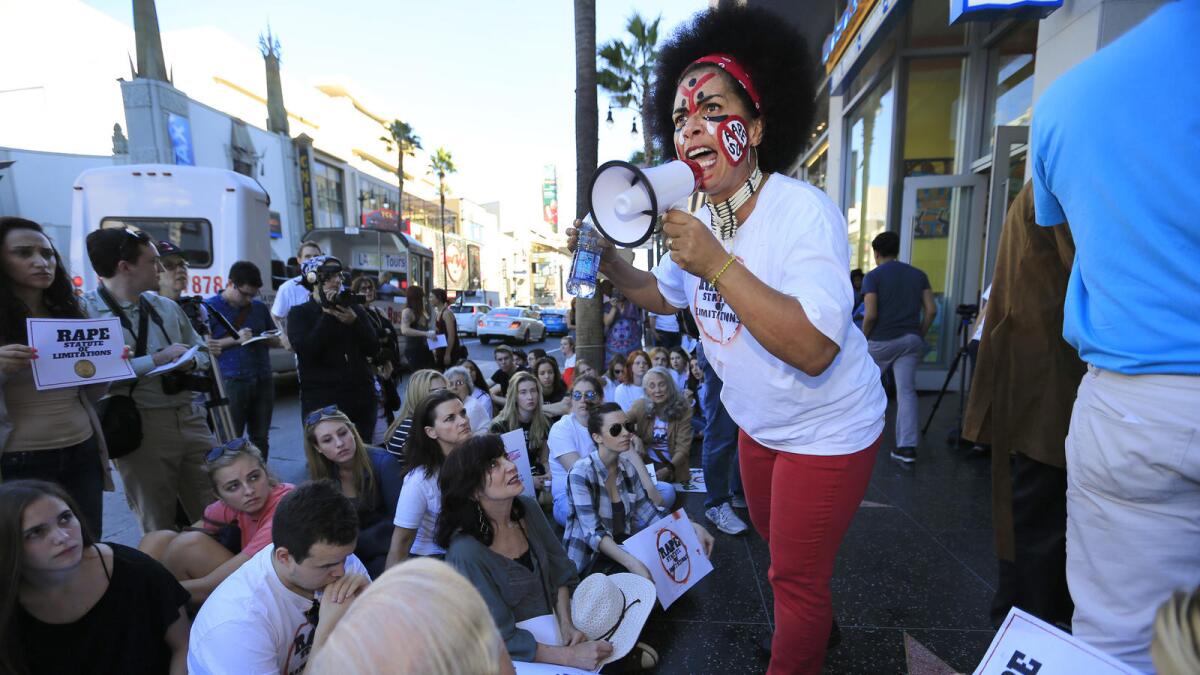
California lawmakers on Tuesday sent the governor a bill to end the statute of limitations for prosecuting rape and other felony sex crimes.
If the governor signs the bill, crimes including rape and child sexual abuse could be prosecuted at any time.
Sen. Connie Leyva (D-Chino) introduced the bill in the wake of news that dozens of women have said comedian Bill Cosby raped them. Most of their cases cannot be prosecuted because the statutes of limitations for those crimes have expired.
“It’s called the Justice for Victims Act for one clear and specific reason: Victims should always have the opportunity to seek justice in a court of law after such a violent act,” Leyva said.
- Share via
An effort to fix California’s outdated campaign cash database approved by the Legislature
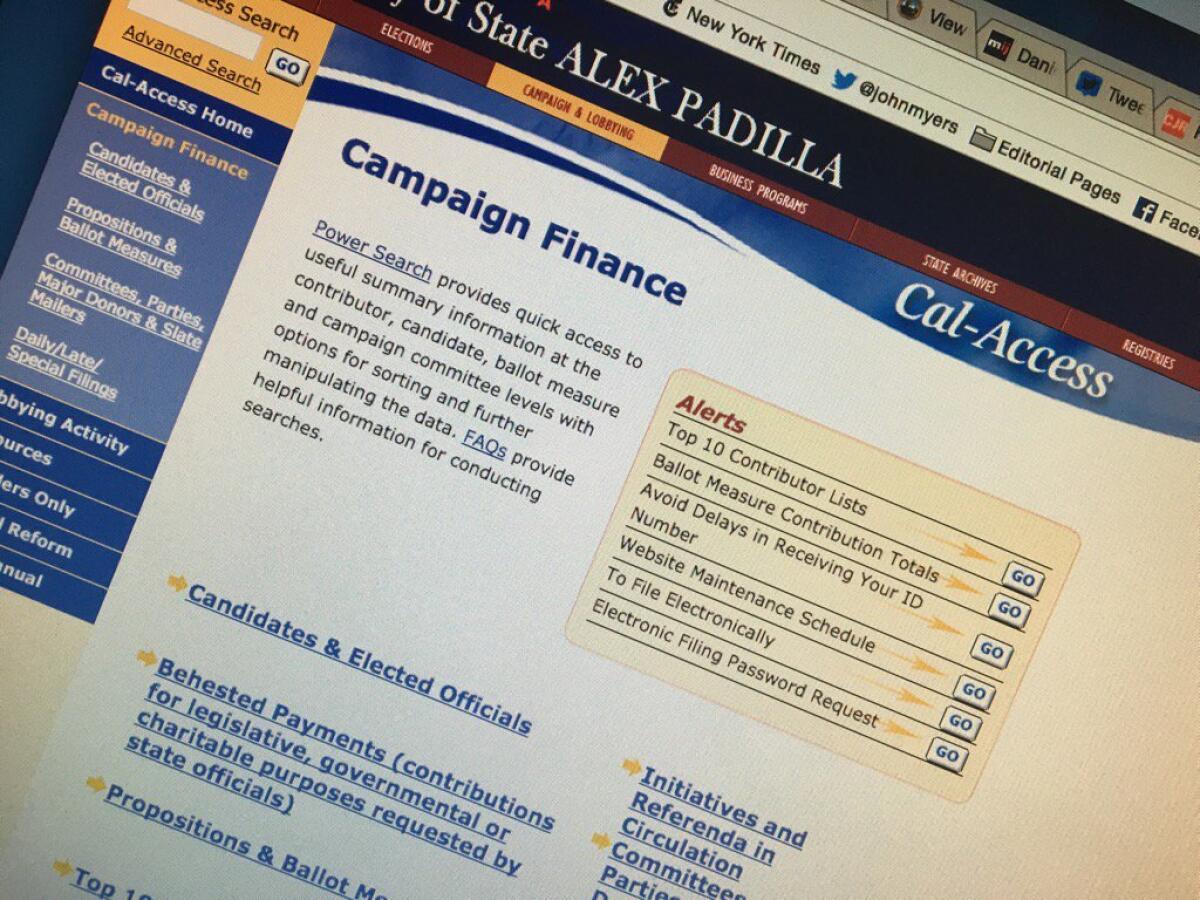
California election officials would have until 2019 to repair or replace the state’s antiquated campaign finance database under a bill sent to Gov. Jerry Brown on Tuesday.
Senate Bill 1349 would require the changes to Cal-Access, the online campaign contribution and lobbying database first created in the late 1990s.
“The last time the Cal-Access program was redone, your mobile phone weighed 10 pounds,” said state Sen. Bob Hertzberg (D-Van Nuys), the author of SB 1349.
The bill does not, however, provide funding for the system overhaul. That cost is estimated at $11.6 million for the actual project, with ongoing costs of about $2.8 million a year to maintain a new system.
- Share via
New campaign donation disclosure rules rejected by the state Senate
Lawmakers on Tuesday narrowly rejected an effort to create new disclosure rules for California political mailers and money gathered from several donors into a single contribution.
Assembly Bill 700 failed by a single vote in the state Senate, needing a supermajority of 27 senators to pass.
The complex campaign finance bill became ensnared in a disagreement this month over whether it represented more or less donor disclosure. The state’s Fair Political Practices Commission voted to oppose late amendments to AB 700 regarding the disclosure rules for “earmarked” contributions.
The bill sought to address instances in which a political contribution is cash collected from a series of donors who ask the identified donor to then “earmark” the money for a particular campaign.
Jodi Remke, the FPPC chairwoman, wrote in a letter last week that the changes to AB 700 would create a “loophole” for some organizations to bypass the contribution limits.
Supporter of the bill disagreed with the FPPC’s interpretation, but the disagreement may have proved a distraction in the bill’s final days.
- Share via
Officially not happening
- Share via
U.S. Labor Secretary Tom Perez tweets support for expanding overtime pay for California farmworkers
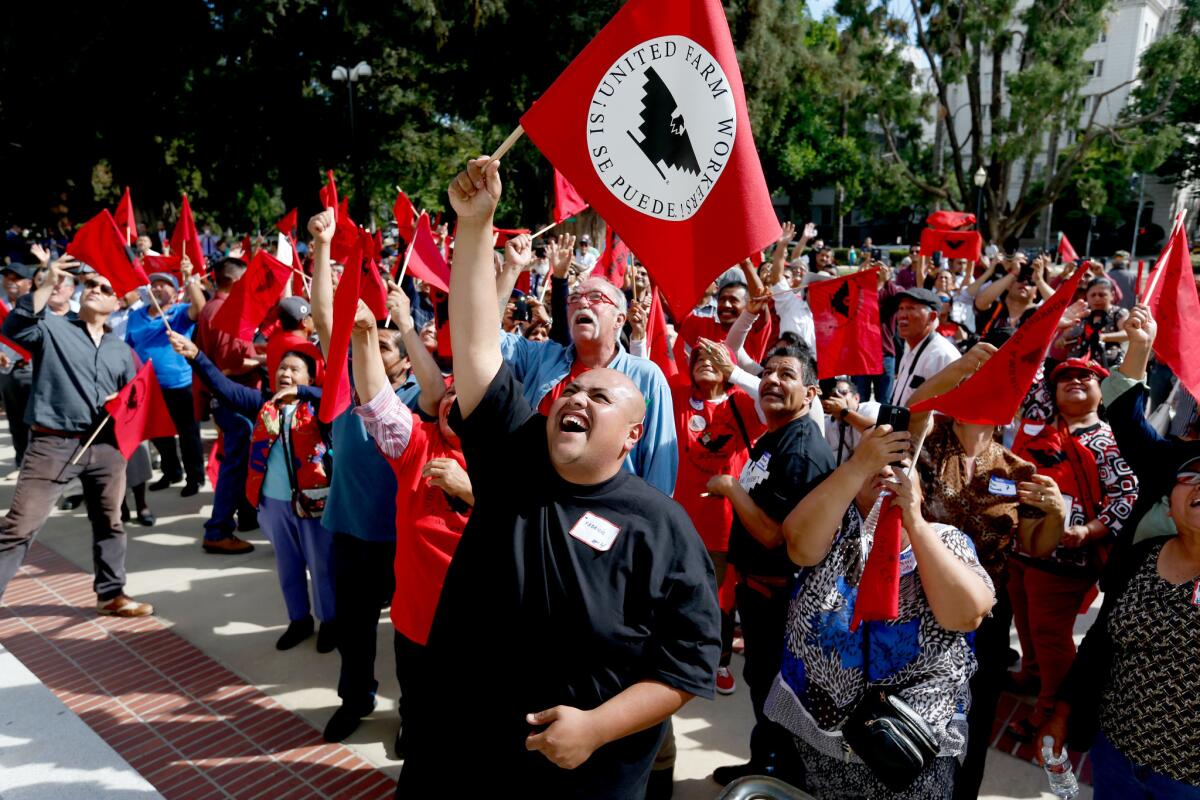
U.S. Secretary of Labor Thomas Perez on Tuesday took to Twitter to voice his support for a California bill that would expand overtime pay for thousands of farmworkers across the state.
Assembly Bill 1066, authored by Assemblywoman Lorena Gonzalez (D-San Diego), is headed to Gov. Jerry Brown after it was approved Monday in a historic vote on the state Assembly floor. Brown has made no indication as to whether he will sign the legislation, and his office said Tuesday he generally does not comment on pending proposals. A spokesman also said he would not comment on Perez’s support for the bill.
The proposal would roll out new rules for farmworker overtime in 2019, lowering the current 10-hour-day threshold for overtime by half an hour each year until it reaches the standard eight-hour day by 2022. It also would phase in a 40-hour standard workweek for the first time. The governor would be able to suspend any part of the process for a year depending on economic conditions.
The United Farm Workers association, which sponsored the bill, said it addressed an injustice inflicted on farmworkers nearly eight decades ago, when they were first exempted from federal minimum wage and overtime standards. The bill has drawn wide and diverse support, including from Democratic presidential nominee Hillary Clinton.
But prominent business groups, led by the California Farm Bureau Federation and a coalition of agricultural producers, have thrown their political weight against it, saying the legislation would devastate the agricultural community and backfire on the workers it seeks to help.
- Share via
Kamala Harris calls for measures to end the ‘crisis of confidence’ between police and the public
U.S. Senate candidate Kamala Harris on Tuesday called for new national policies to reduce recidivism by felons released from prison and to make data on crime and police actions more accessible to the public.
Harris, California’s attorney general, made the comments during a roundtable discussion on criminal justice at Community Coalition in South Los Angeles.
Harris said there is a “crisis of confidence” between law enforcement and communities that must be addressed. She spoke about how the fatal police shooting of Philando Castile in Minnesota in July and the ambush that killed five Dallas police officers shortly afterward broke “our collective hearts.”
Harris also called for more diversity in law enforcement agencies and additional training to eliminate police bias.
In 2015, Harris launched her agency’s “Open Justice” website, which provides public access to data on arrest rates, in-custody and arrest-related deaths and law enforcement officers killed or assaulted — breaking the numbers down by race and ethnicity, cause of death and other factors.
That is a model of how criminal justice data should be made more transparent nationwide, she said.
“We need to have mandatory data collection. Publication of data,” Harris said. “Which means, those who have the information have to report it. ... And the place where’s its being reported should make it transparent.”
Harris added that “transparency includes universal protocols around body cameras” for law enforcement officers.
Last year, Harris stopped short of supporting statewide requirements for officers to wear the body cameras, including legislation by Assemblywoman Shirley Weber (D-San Diego) to develop statewide standards on how the cameras would be operated and when the footage could be viewed.
Harris, who launched a pilot program on body cameras at the state Department of Justice, had cautioned against using a “one-size-fits-all” approach to regulate their use.
Harris campaign spokesman Nathan Click said there’s been no change in Harris’ position. He said her comment Tuesday was in reference to the findings from the pilot program at the Department of Justice.
Harris is running to succeed retiring Sen. Barbara Boxer and is being challenged by a fellow Democrat, Orange County Rep. Loretta Sanchez.
- Share via
Cal State students could get help graduating on time under bill sent to governor
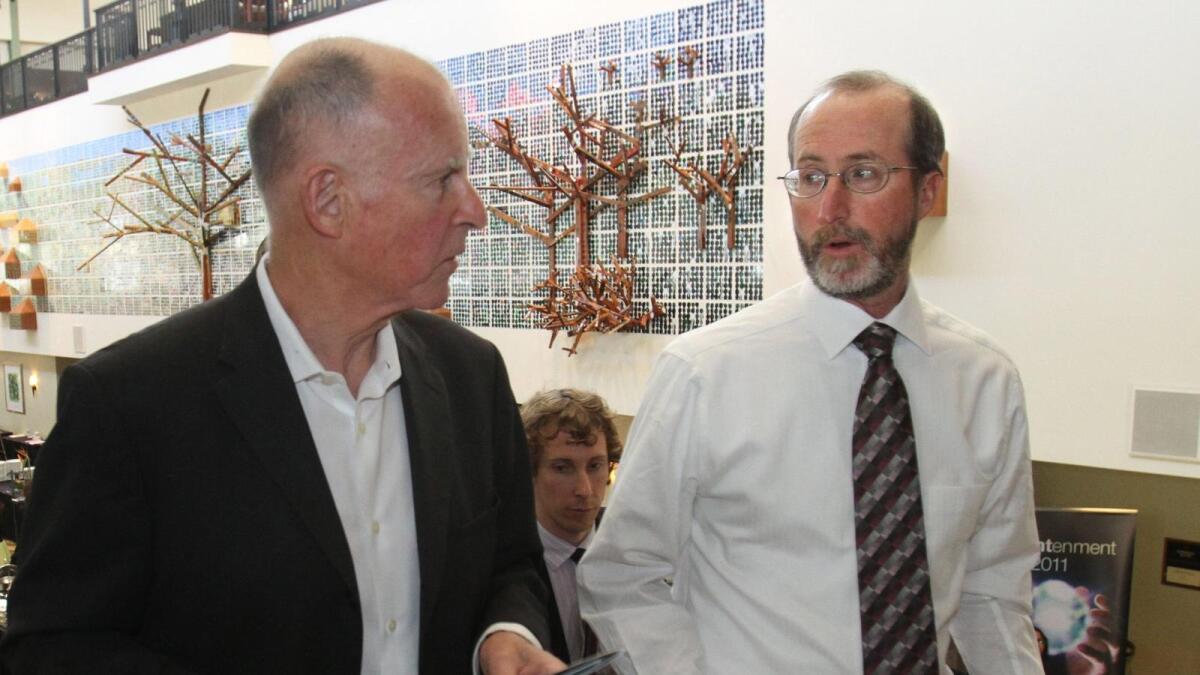
California lawmakers on Tuesday sent the governor a bill that could help students graduate in four years from California State University schools.
Only 19% of students at Cal State campuses graduate in four years, state Sen. Steve Glazer (D-Orinda) said, citing statistics from 2011. Glazer’s bill would create programs at Cal State campuses to help students graduate on time. Students in the programs would receive extra support from academic advisors and priority registration in classes. They would be required to take a minimum number of credits and maintain a qualifying GPA.
Low-income and first-generation students, as well as community college graduates and students from communities with low college attendance rates, would be given priority to participate in the programs. They would also have to be eligible for in-state tuition.
State Sen. Ed Hernandez (D-West Covina) lauded the bill and said it would have helped him when he was in college. He said it took him six years to graduate with a bachelor’s degree from a California State University.
“If I had something like this when I was in college, it would have given me the tools to perhaps graduate in four years,” he said.
State Sens. Robert Huff (R-Diamond Bar) and Pat Bates (R-Laguna Niguel) both praised the legislation, but questioned whether it should be made available to more students. Huff said he wished the program were available to every Cal State student, not just a “limited subset.”
Glazer defended the legislation, saying better graduation rates for a subset of students would save the state money and open spots for other students.
“I’m convinced that everyone will benefit from a more efficient university system,” Glazer said. “This legislation will open up more pathways to student success and four-year degrees.”
- Share via
Smoking would be banned in California state parks and beaches in bill sent to governor
Amid concerns over health impacts and wildfires, smoking and using electronic cigarettes would be outlawed at California’s 270 state parks and beaches under a bill sent by state lawmakers to the governor on Tuesday.
The measure creates a fine of up to $250 for those caught vaping or smoking a cigar or cigarette, or disposing of the remains of a cigarette on a state beach or park.
“SB 1333 will make our state parks and beaches cleaner and safer by reducing cigarette and tobacco litter, curtailing exposure to second-hand smoke and limiting the threat of park fires,” Sen. Marty Block (D-San Diego) told his Senate colleagues Tuesday before they voted 26-10 to approve the bill. He also said cigarette trash can hurt wildlife and fish.
The bill is backed by the California State Firefighters Assn., the American Cancer Society Cancer Action Network, Sierra Club Sacramento and the Surfrider Foundation.
It has been amended from Block’s original proposal to include a provision allowing the director of the state Department of Parks and Recreation to designate small areas in parks where smoking would be allowed.
- Share via
Sentencing laws in California could be changed to add language about rehabilitation
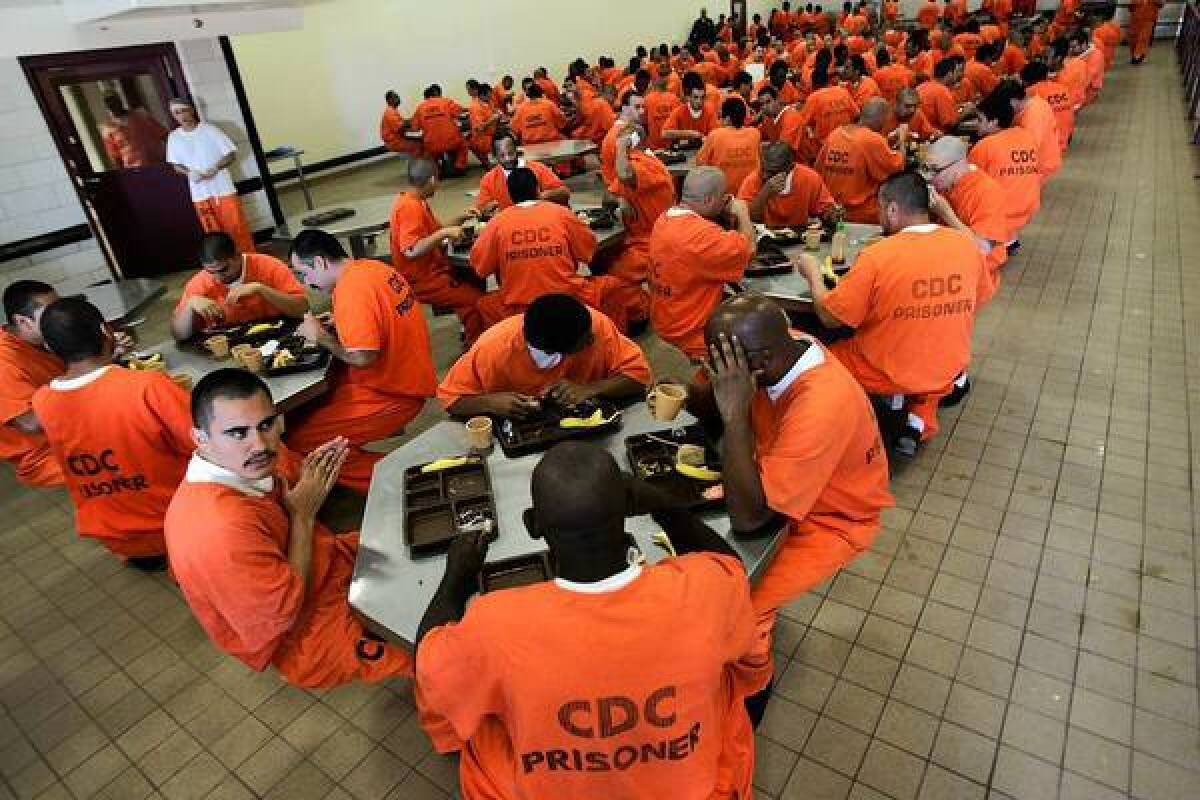
California lawmakers voted Tuesday to add language to sentencing laws that would promote so-called restorative justice.
State law says the purpose of imprisonment is “punishment.” The bill the California Assembly voted to send to the governor Tuesday, AB 2590, would amend the law to state that the “purpose of sentencing is public safety achieved through punishment, rehabilitation, and restorative justice.”
The California Department of Corrections and Rehabilitation would have to update its policies to promote inmate rehabilitation under the bill.
AB 2590 now goes to the governor.
- Share via
California could see new rules on flying drones in state parks

California soon could have new rules on flying drones in state parks, where regulations on the use of unmanned aircrafts have been vague and vary widely.
This bill, authored by Assemblyman Chris Holden (D-Pasadena), makes it unlawful to launch, land or operate a drone without a permit on lands managed by the California Department of Parks and Recreation and the California Department of Fish and Wildlife. It also prohibits the use of drones in the taking of fish or animals.
AB 2148 moved out of the state Assembly with a 45-15 vote.
Under federal law, unmanned aircraft are prohibited in national parks without a permit, a ban that covers 59 locations and about 350 national monuments, seashores and other sites — about 84 million acres in all.
But there are no blanket rules for California’s state parks, and the state park system has no systemwide drone policy in place.
With such few regulations for drones, Holden said, “it’s like the wild, wild West out there.” He said his bill would create a safer environment at state parks, while allowing some exemptions for drone use, such as for conservation or scientific research and for legitimate newsgathering purposes.
The National Park Service reported at least 10 drone incidents in areas of Washington, D.C., in 2015, including a Dec. 16 citation of a man operating a drone near the Washington Monument.
A drone also was said to be the cause of a big horn sheep stampede in Utah’s Zion National Park, and studies suggest that such aircraft can distress bears, sea lions and gulls.
But critics have called the bill one of several piecemeal solutions that remained after major drone lobbying efforts killed wider statewide drone regulations this legislative session.
- Share via
California lawmakers approve bill to deny state contracts to companies that boycott Israel
Lawmakers took action Tuesday to prevent California state government agencies from awarding contracts to companies that participate in a boycott of Israel.
AB 2844 requires any company that accepts a state government contract of $100,000 or more to certify that it’s not in violation of California civil rights law -- which, said the Assembly members who wrote the bill, would include companies involved in an international Israeli boycott.
That global campaign -- the Boycott, Divestments and Sanctions movement -- is intended to put pressure on Israel to change its policies until the country ends its occupation of “all Arab lands” and recognizes an independent Palestine.
Other states have taken similar action, and the bill was the subject of eight separate amendments during the 2016 legislative session in Sacramento.
“The bottom line is that the state should not subsidize discrimination in any form,” said the bill’s author, Assemblyman Richard Bloom (D-Santa Monica).
AB 2844 now heads to Gov. Jerry Brown for a signature or veto by the end of September.
- Share via
Compromise struck on Planned Parenthood-backed bill on secret recordings
A deal has been struck on a controversial bill sponsored by Planned Parenthood to create new penalties for distributing illegal recordings in the wake of high-profile secret videos circulated by anti-abortion activists.
The bill, by Assemblyman Jimmy Gomez (D-Echo Park), had sought to create a new crime for distributing video or audio recordings involving a healthcare professional that were taken without a person’s consent. In California, it is already illegal to make such recordings without all parties’ authorization.
Planned Parenthood argued that adding additional punishment for circulating those recordings was necessary following the controversial videos taped by David Daleiden and other anti-abortion activists that purported to show Planned Parenthood employees illegally trafficking in fetal tissue. The healthcare provider, which has not been found guilty of any wrongdoing, says the videos were manipulated.
“After the video smear campaign last summer, we experienced a ninefold increase in violence against our providers and our health centers,” said Beth Parker, chief legal counsel of Planned Parenthood Affiliates of California.
“With the Internet and the tremendous wildfire nature in which news can be spread now through social media, we need to have a crime against distribution by those in particular who did the illegal recording,” Parker said. “A slap on the hand of a $2,500 fine isn’t sufficient.”
But the proposal immediately raised alarm among civil liberties activists and press organizations, which argued such a penalty could ensnare journalists who are reporting on secret videos.
After multiple rounds of amendments, the two sides appear to have reached a compromise: The bill will now make clear that members of the media cannot be held liable if they did not participate in the initial illegal recording.
“We took precautions to make sure the press could still do their jobs,” Gomez said on Tuesday.
Nikki Moore, legal counsel to the California Newspaper Publishers Assn., said with the anticipated changes — set to be put into the bill Tuesday — her group will move from opposed to neutral on the measure.
“While we find it troubling that this bill potentially criminalizes speech, we realize this bill had political momentum and our immediate concern is to protect newspapers and journalists,” Moore said.
Another opponent of the bill, the American Civil Liberties Union, did not immediately respond to a request for comment on the changes.
Gomez said he wasn’t surprised by the heated back-and-forth surrounding his bill, AB 1671.
“I always knew it’d be difficult to balance the right of privacy and the right of free speech,” Gomez said. “I think that is a tension that we’ve seen in court case after court case and law after law. And we always strive to find that right balance.”
- Share via
Police agencies could soon charge more for concealed-weapon permits under bill headed to governor

The state Assembly on Tuesday sent the governor a bill that would allow local police and sheriff agencies to increase the fee for issuing concealed weapon permits, removing the current $100 cap and allowing charges that fully recover costs for enforcement.
Assemblyman Kevin McCarty (D-Sacramento) introduced the measure, saying the cap has resulted in Sacramento County facing a budget shortfall of about $250,000.
“Unfortunately, the current fee structure is rigid, leaving a strain on some local budgets,” McCarty said.
McCarty said the bill does not change the requirements for Californians to get a license to carry a concealed weapon.
But Republican Assemblywoman Melissa Melendez of Lake Elsinore said the bill will not prevent gun violence but could result in “pricing people out of their constitutional right” to carry guns.
“It is not going to increase anybody’s safety,” she added.
McCarty countered that the bill will provide cities and counties with “ample resources to do proper vetting to keep [concealed-weapon permits] out of the hands of people who should not have them.”
- Share via
If you can’t vote in person, this bill would allow anyone you choose to turn in your ballot
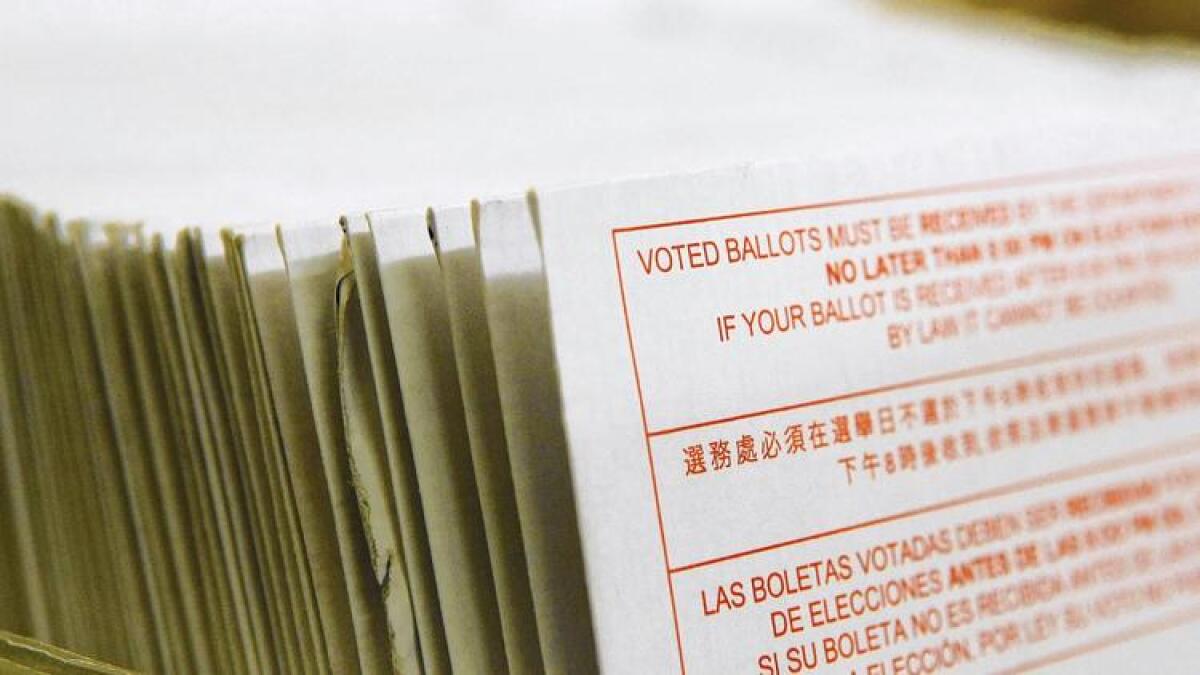
Ballots cast by California voters could be turned in at elections offices by anyone, including campaign workers or political party officials, under a bill sent to Gov. Jerry Brown on Tuesday.
Assembly Bill 1921 removes the language in existing state law that limits help in submitting a vote by mail ballot to close family members. The bill’s author, Assemblywoman Lorena S. Gonzalez (D-San Diego), has said those limitations are an obstacle to getting ballots back in a timely fashion for voters in need of help.
In a legislative committee hearing in June, opponents noted that AB 1921 has no maximum number of ballots a single person can turn in and could therefore open the door to vote tampering during large-scale ballot gathering efforts.
Most other states that allow someone to turn in multiple ballots generally limit it to as many as 10 ballots. AB 1921, however, places no maximum number on those that could be submitted to California elections officials by a single person.
The bill passed with no floor debate on Tuesday in the Assembly. Brown has until Sept. 30 to sign it into law or veto it.
- Share via
Smoking would be banned on California college campuses under bill sent to governor
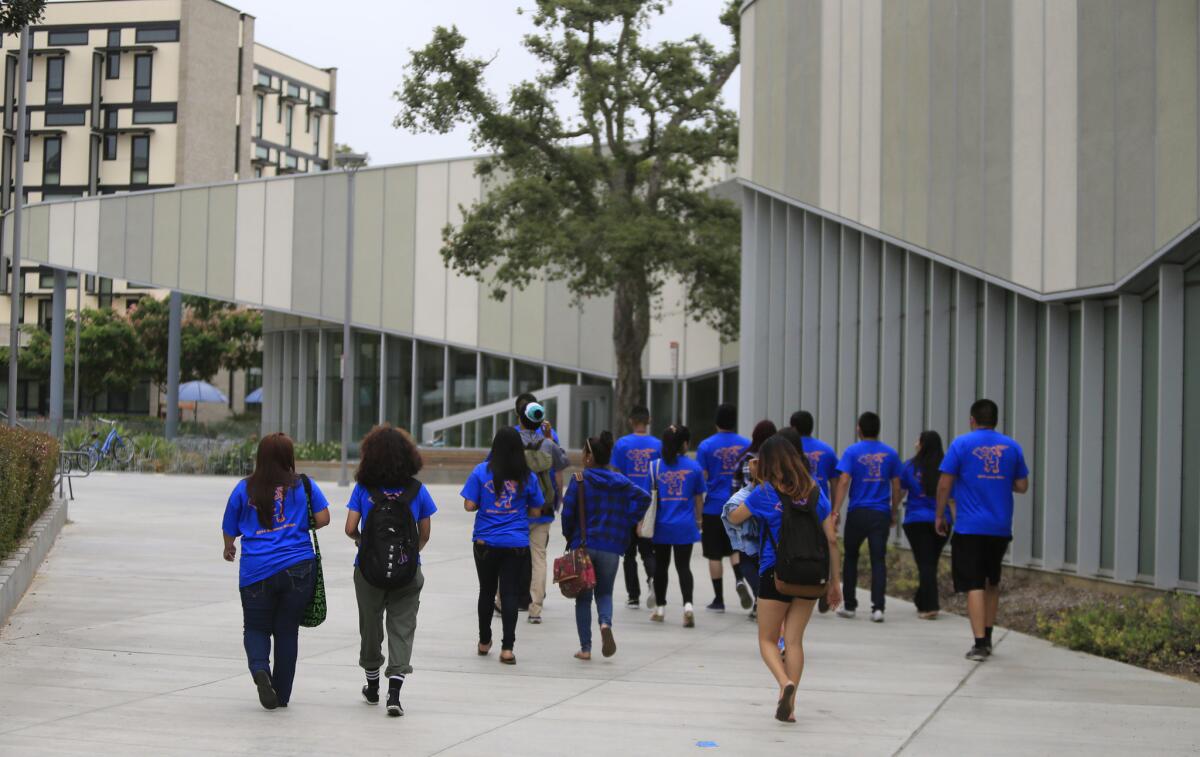
Smoking and the use of electronic cigarettes would be banned on campuses of the California State University and California Community Colleges systems beginning in 2018 under legislation approved Tuesday by the state Assembly.
“We need to promote a safe and healthy environment for the campus staff, students and faculty,” said Assemblyman Kevin McCarty (D-Sacramento), who introduced the measure. “This bill helps address the harmful health effects that come with smoking and secondhand smoke on our college campuses.”
The bill is one of many anti-tobacco measures the governor is considering this year.
It follows the model set by the semi-autonomous University of California system, which adopted a tobacco-free policy that took effect in 2014. The Cal State system is nearing completion of a smoking policy, but the practice is already banned at Cal State Fullerton.
The community college chancellor’s office says 18 of the 72 community college districts, comprising 37 campuses, already have smoke-free policies.
The bill calls for fining violators $25 for the first offense, up to $100 for the third and additional offenses, with the money going to anti-smoking education and cessation programs.
- Share via
California soon could enhance penalties for sex buyers
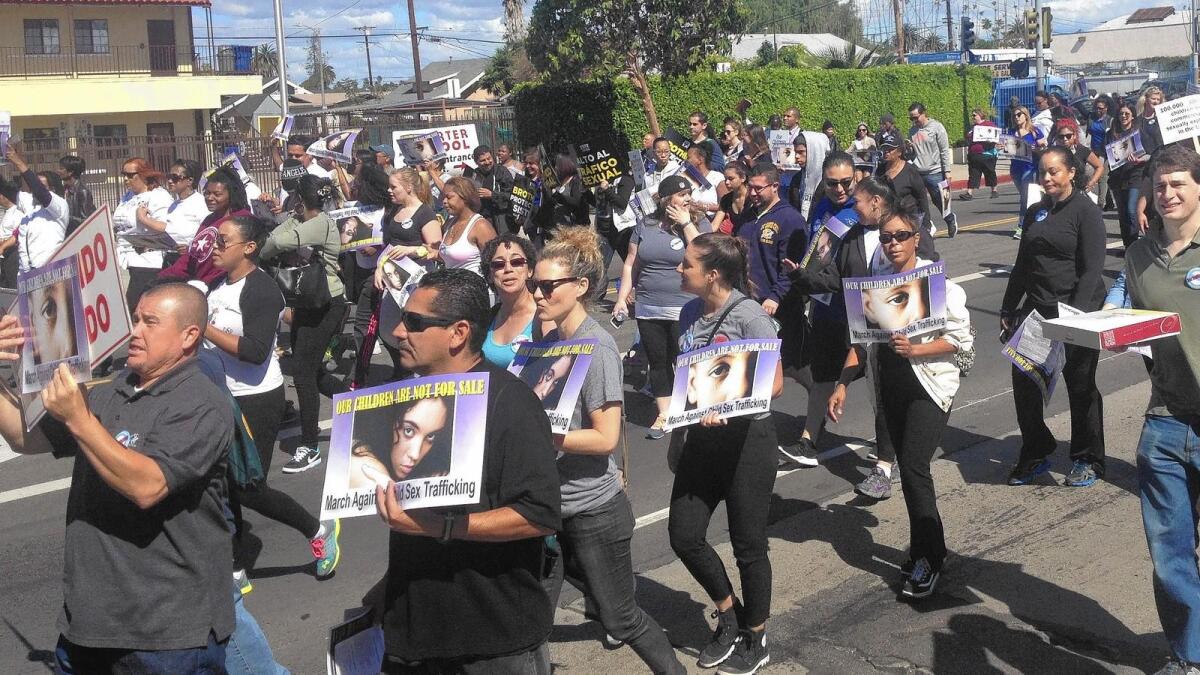
The state Assembly on Tuesday sent a bill to Gov. Jerry Brown that would enhance penalties for sex buyers, one of at least two dozen bills this legislative session that have sought to curb the trade of forced sex and labor.
AB 1708, authored by Assemblywoman Lorena Gonzalez (D-San Diego), would enhance penalties for sex trafficking near schools and impose minimum fines and mandatory minimum county jail terms for people convicted of purchasing commercial sex.
It also would recast the crime of prostitution so that the statute differentiates between people receiving compensation for sex from sellers and buyers of sex.
By redefining the statute, Gonzalez said, law enforcement officials will be able to decriminalize prostitution for victims and increase the punishment for those who fuel the trade. But the bill might be a tough sale to Brown, who has tended to oppose tough-on-crime policies in the past.
- Share via
California may start giving vouchers for diapers to families on welfare

California families on welfare would receive a $50 monthly diaper voucher for young children under a bill sent to the governor Tuesday.
The bill would provide a benefit to families in CalWORKs, the state’s welfare program, that could be used only to purchase diapers. Starting in 2020, families in the program would receive the diaper benefit each month for each child younger than 2.
The California Assembly passed the bill 54-12. It requires the governor’s approval to become law.
Diapers may soon become cheaper for all families under a separate bill sent to the governor this month. That bill would exempt diapers from California sales taxes.
This post has been updated to reflect an updated vote total.
- Share via
Assembly members say goodbye to those who are leaving in 2016
- Share via
Will the Legislature actually wrap up its work early?
- Share via
State senator introduces resolution to condemn EpiPen price hikes
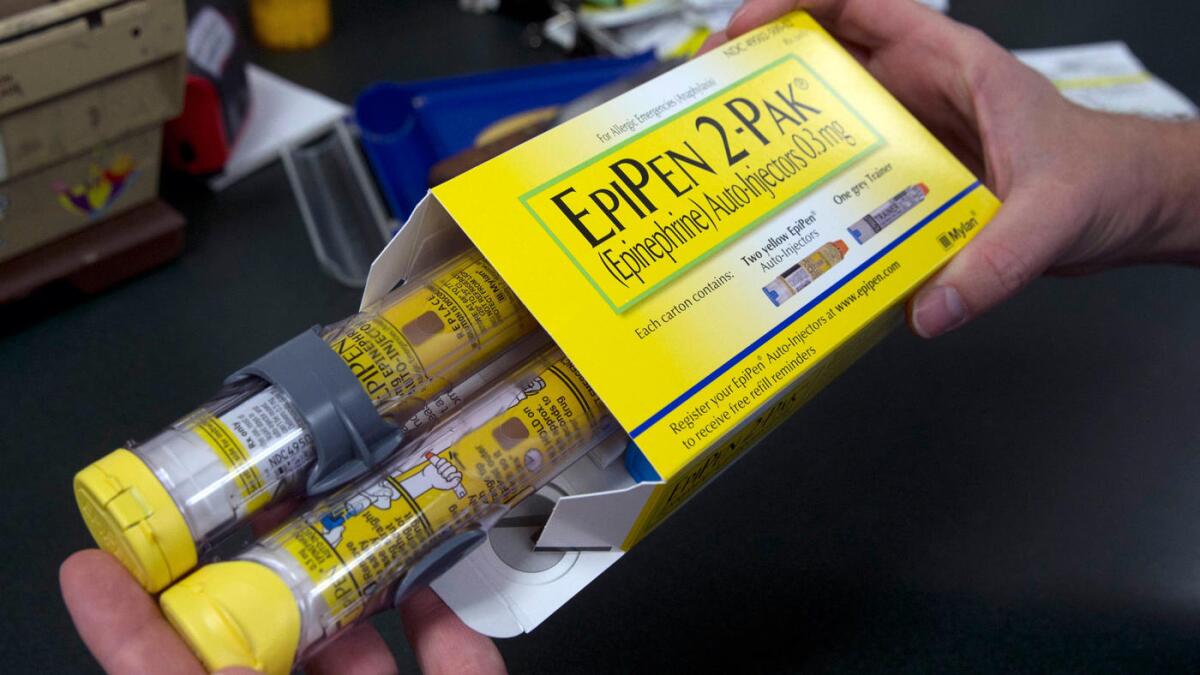
State Sen. Ed Hernandez’s attempt to push through a drug pricing transparency bill sputtered this year, but the West Covina Democrat still wants his colleagues to weigh in on the latest controversy in the cost of prescription drugs: the surging price of EpiPens.
Hernandez is introducing a resolution that excoriates the anti-allergy device’s manufacturer, Mylan, joining a chorus of federal lawmakers who have accused the company of price-gouging.
The price of the emergency injection devices meant to treat severe allergic reactions climbed to more than $600 for a two-pack — a more than 500% increase since the drug was acquired by Mylan. Following a firestorm about the price hike, the company has since announced will offer coupons to offset the high cost and that it will sell a cheaper, generic version of the drug.
Hernandez’s resolution would urge Congress to investigate Mylan’s near-monopoly on the EpiPen and would urge the federal Food and Drug Administration to reconsider denying approval of generic alternatives.
“The federal administration and Congress have the power to limit the unrestrained ability of Mylan to gouge our health care system, and they should use it,” Hernandez said in a statement.
The measure is the latest sign that Hernandez will continue to hammer pharmaceutical companies on prescription drug prices, even though he opted to pull his measure SB 1010 after it was significantly scaled back earlier this month.
Hernandez, the chair of the state Senate health committee, intends to hold a series of informational hearings about drug prices in the fall, and he plans to invite Mylan’s chief executive to participate in one.
“My experience with Senate Bill 1010 has made me more resolved than ever to bring transparency to these arbitrary and harmful drug price increases,” he said. “In addition to the series of informational hearings on rising drug prices, I will reintroduce SB 1010 in December. However, something must be done now to correct the market for this particular drug.”
The joint resolution will come up for a vote on the Senate floor Tuesday afternoon and will then head to the Assembly. It must clear both houses by the close of the legislative session on Wednesday.
- Share via
Four human trafficking bills to help victims swept into the legal system head to Gov. Jerry Brown
The state Assembly on Monday sent four bills to Gov. Jerry Brown that aim to provide services to human trafficking victims swept into the legal system.
Measures to curb the forced trade of sex and labor have been highly debated this legislative session. But the following bills passed with little opposition.
- Share via
Bullhooks to control elephants banned in California
Gov. Jerry Brown on Monday signed legislation outlawing the use of bullhooks to handle and control elephants in California even as many animal handlers have stopped using the devices.
The measure by Sen. Ricardo Lara (D-Bell Gardens) got a boost after similar measures were adopted in the cities of Los Angeles and Oakland, and after Feld Entertainment announced an end to traveling elephants in the Ringling Bros. Barnum & Bailey circuses.
More than 70 Hollywood celebrities including Woody Harrelson, Kim Basinger and Hilary Swank sent Brown a letter urging him to end what they called inhumane treatment of animals.
“California’s commitment to the humane treatment of elephants is strengthened today,” Lara said. “Banning bullhooks removes cruel and horrific treatment against these kind, gentle animals.”
Last year, Brown vetoed a similar measure saying he was concerned it was part of a flurry of bills that was creating more crimes without considering alternatives. Brown declined to comment Monday on why he signed the new bill.
Ed Stewart, president and co-founder of the Performing Animal Welfare Society, which cares for eight elephants at its California sanctuary, said: “By its very design, the bullhook is meant to inflict pain and instill fear. The use of this archaic and inhumane weapon on elephants -- a species that is self-aware, intelligent and emotional -- is abhorrent.”
- Share via
Was your ballot counted? You’ll be able to find out if Gov. Jerry Brown signs this bill
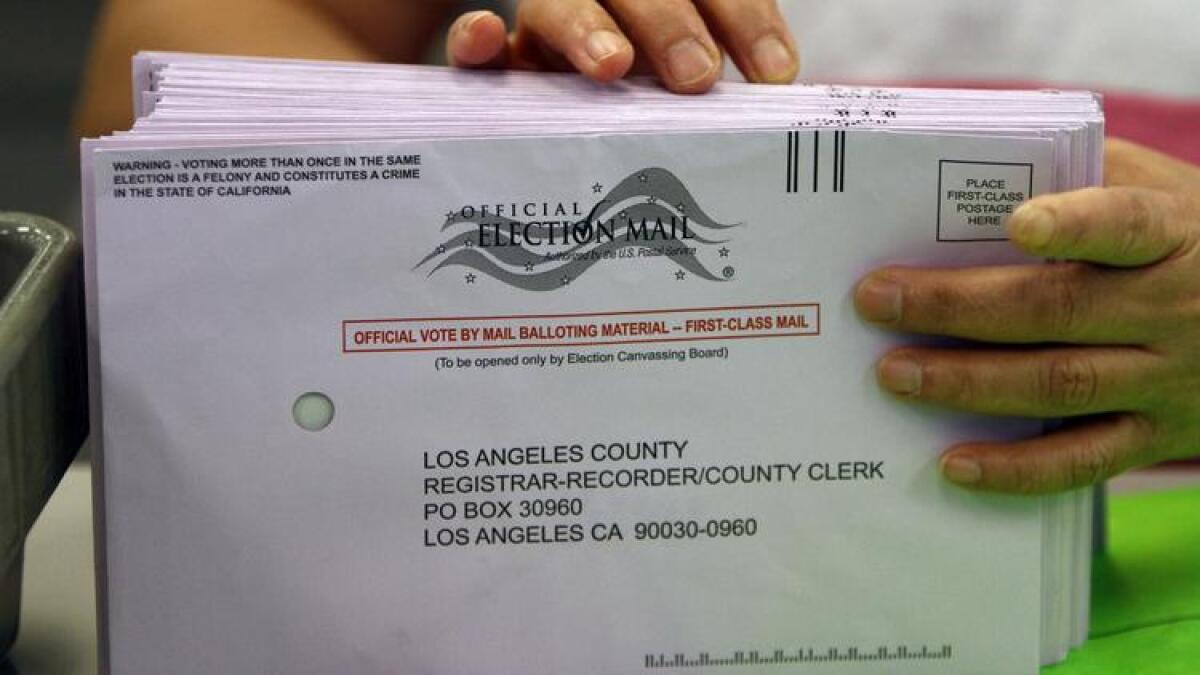
Californians would have a new legal right to be told whether their ballot was counted under a bill that won final approval in the Legislature on Monday.
AB 2089 won bipartisan support in the Assembly and now heads to Gov. Jerry Brown.
The bill’s author, Assemblyman Bill Quirk (D-Hayward), tweeted the news just after the final vote.
In every election, a small number of marked ballots aren’t counted for a variety of reasons -- from arriving too late to being damaged or illegible and beyond.
AB 2089 would require county registrars of elections to set up a free system enabling voters to check what the ultimate outcome was of their own ballot and, if it wasn’t counted, why.
“Many of our constituents whose votes aren’t counted at a registrar’s office never know,” said Assemblywoman Catherine Baker (R-San Ramon).
- Share via
An effort to impose campaign donation limits on local races is killed by the state Senate
State lawmakers rejected a plan on Monday to place limits on individual campaign donations for city and county offices, races where in some California communities there are no restrictions on the size of a legal donation.
Assembly Bill 2523 was supported by a simple majority of senators, but had been recently amended to require a supermajority vote to actually pass.
The bill would have set the maximum campaign donation in a local campaign at a level equal to those for Assembly and Senate races, currently $4,200. It would have allowed local communities to set lower limits if desired.
Democrats and Republicans disagreed during the Senate floor debate as to whether setting contribution limits would effectively limit the influence of money on local politics.
Floor debate over the bill had just begun when Senate Republicans halted the proceedings and asked for a private caucus meeting of their members.
The bill would have required only a single GOP senator’s support to pass.
- Share via
Ratepayers will remain on the hook for gas leaks after Assembly rejects new legislation

Though it was approved by the state Senate earlier this year, legislation that would have prevented ratepayers from being charged for natural gas lost during leaks fell far short and stalled in the Assembly on Monday.
The issue gained new attention in the wake of the Aliso Canyon natural gas leak, which lasted four months and forced thousands of people to relocate because of foul air. Although an executive order from Gov. Jerry Brown helped protect ratepayers from covering the cost, there are other, smaller leaks for which they’re still charged.
“If your gas bill is $50 a month, some small part of that is paying for gas you never got,” said Timothy O’Connor, an attorney at the Environmental Defense Fund.
Sen. Mark Leno (D-San Francisco), the bill’s author, said utilities would be more likely to fix problems with their equipment and prevent methane pollution if they couldn’t charge ratepayers for gas that is lost due to leaks or venting.
“Why we should we be paying for the faults in their system?” he said. “We’re paying to work against our own climate goals.”
Advocates said utilities ramped up their lobbying in their effort to kill the measure, which they view as unnecessarily punitive. The bill would “penalize utilities for the value of natural gas lost due to factors outside of the utilities’ control,” said Chris Gilbride, a Southern California Gas Co. spokesman. “This includes venting for safety and reliability, and damage to pipelines caused by third parties.”
Other business organizations, including the California Chamber of Commerce, have also opposed the bill, calling it “yet another burden put onto already heavily regulated industries.”
- Share via
Measure that would ease building additional housing units goes to the governor
- Share via
Gender pay equity could be expanded under this measure
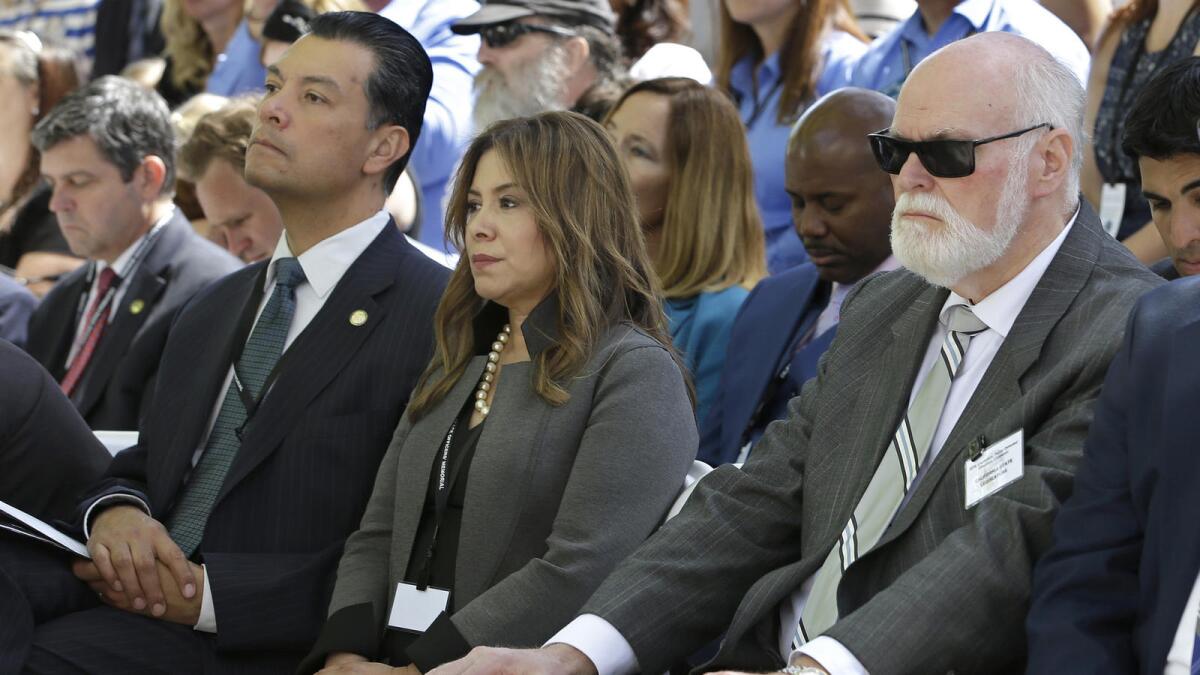
A bill sent to the governor Monday would prevent California employers from paying women less than male colleagues based on prior salary.
The state strengthened its protections against gender-based wage discrimination last year. The bill the state Assembly sent the governor Monday, AB 1676, would add prior salary to the list of reasons women can’t be paid less than men.
Nationally, a woman on average makes roughly 79 cents for every dollar a man makes, according to U.S. Census Bureau data from 2014.
AB 1676, authored by Assemblywoman Nora Campos (D-San Jose), joins another pay equality bill sent to the governor last week that would strengthen protections against wage discrimination based on race or ethnicity.
An earlier version of AB 1676 would have barred employers from asking job applicants about prior salary, but amendments cut that provision from the bill.
The governor vetoed a similar bill last year and said in his explanation that the legislation was flawed because it hindered employers from seeking “relevant information” when determining a worker’s salary.
- Share via
Major changes in California elections are on the way if Gov. Jerry Brown signs this bill
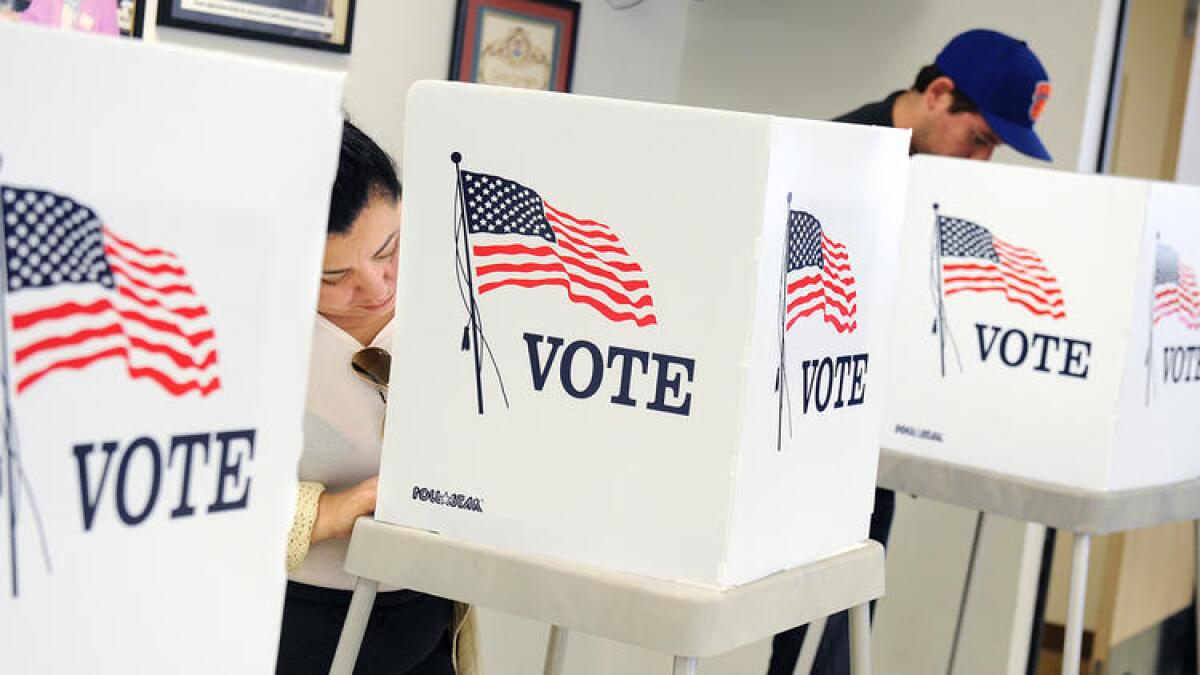
A broad push for millions more California ballots to be cast somewhere other than polling places is now in the hands of Gov. Jerry Brown, after lawmakers on Monday gave final approval to a plan that would allow thousands of neighborhood polling places to be closed.
Senate Bill 450 would focus the work of local elections officials on newly created “vote centers,” one-stop election offices spread out in communities to allow early voting and late voter registration.
Supporters have consistently pointed to low voter turnout in recent elections as the impetus for a substantial revamping of the system.
“We’ve got to figure out a way to implement a new voting model,” said state Sen. Ben Allen (D-Santa Monica), the bill’s author, during Monday’s floor debate.
SB 450 would allow a handful of counties, if they agree to use the new system, to open fewer “vote centers” than polling places in 2018. The rest of California’s counties could follow suit in 2020.
And with the exception of Los Angeles County, those counties would have to mail each voter a ballot. Those ballots could be dropped off at new, secure drop boxes in various places around the county.
(Los Angeles County would have an additional two years to comply with the mailed ballot mandate.)
Sen. Joel Anderson (R-Alpine) voted against SB 450, and said he didn’t believe the bill does enough to address the needs of the disabled when moving away from in-person voting.
Anderson also took issue with suggestions that the system is based on a similarly conceived voting system in Colorado, arguing that Colorado has more strict voter fraud rules than does California.
“We’re not doing the Colorado model,” Anderson said.
- Share via
New mandatory prison sentence bill inspired by Stanford sexual assault heads to governor’s desk
State lawmakers passed a bill Monday to add mandatory prison sentences for certain sexual assaults – a measure inspired by a Santa Clara County Superior Court judge’s decision not to sentence a Stanford University student to prison in a high-profile case this year.
The June decision by Judge Aaron Persky to sentence Stanford student Brock Turner to six months in jail after sexually assaulting an unconscious woman sparked significant criticism that the punishment was too lenient.
Under current California law, those convicted of rape using additional physical force must serve time in prison. This measure would require the same punishment for sexual assaults of those unconscious or incapable of giving consent due to intoxication.
“If we let a rapist off with probation and little jail time, we re-victimize the victim, we dissuade other victims from coming forward and we send a message that sexual assault of an incapacitated victim is just no big deal,” Assemblyman Bill Dodd (D-Napa), a coauthor of the measure, said during floor debate in the Assembly.
The bill, AB 2888, passed unanimously in the Assembly and now heads to Gov. Jerry Brown’s desk.
Opponents of the measure have argued the state’s history of mandatory sentencing has disproportionately affected people of color and led to the state’s large prison population.
- Share via
California farmworkers could see overtime expanded in the next decade after historic Assembly vote
In a historic win for farmworkers, California lawmakers on Monday passed legislation that would expand overtime pay for more than 825,000 laborers who bring produce to stores and tables across the state.
AB 1066, authored by Assemblywoman Lorena Gonzalez (D-San Diego), calls for a four year phase-in of new overtime rules beginning in 2019, ultimately resulting in overtime pay for more than eight hours of work in the fields in 2022. It is headed to Gov. Jerry Brown after it was approved 44-32.
The decision followed another intense showdown on the floor of the state Assembly, where a similar proposal died in June four votes short of the majority it needed to pass.
As the vote was tallied, applause broke out inside the Assembly chamber and in an overflow room, where more than 100 farmworkers watched the debate on a livestream feed.
Outside the Assembly floor, Gonzalez exchanged warm embraces with workers and labor union leaders. “These workers have been the face of this bill,” she said. “They’re the ones who pushed it, not just today but for decades in California.”
Arturo Rodriguez, president of the United Farm Workers of America, which sponsored the measure, lauded the workers who came to the Capitol, losing a day of work, to, as he put it, “be able to witness history.”
“These are the men and women who every day ensure that we have fruit, vegetables and wine on our tables,” he said.
During what was an emotional debate, supporters of the bill framed the legislation as a matter of human rights and dignity of work, saying farm laborers deserved the same protections as the vast majority of workers.
Assemblyman Jose Medina (D-Riverside) called the vote an opportunity to correct a wrong against a subset of workers that would do more to honor Cesar Chavez than any ceremony, walk or statue.
Assemblyman Tony Thurmond (D-Richmond) said it was about a simple equation: “A fair day’s pay for a fair day’s work.”
“This is not an attack on those who employ farmworkers,” Thurmond said. “But this is in fact what farmworkers have asked us to do. They have asked us to give them dignity, and we have the opportunity to make history today—history that has been 80 years in the making.”
Opponents said they were frustrated with rhetoric that implied farmers did not care about their workers, calling the bill purely symbolic. In a critique similar to those used by opponents of increasing the minimum wage, they argued it could backfire on farmworkers, as it saddled farmers and growers with higher costs and could force them to limit work hours and hire more employees.
“We are asking our farmers to compete in a global market with a higher cost than any other industry,” said Assemblywoman Shannon Grove (R-Bakersfield).
Assemblyman James Gallagher (R-Nicolaus) argued the bill ignored the will of “people with their hands in the dirt.”
“This bill means they will get less hours, that they will have less money in their pockets,” he said.
The Western Growers Association called the Assembly decision a major disappointment, calling it “short-sighted policy.”
“The members who voted for this bill have placed California farms at an even further competitive disadvantage internationally and with other states,” Western Growers President and CEO Tom Nassif said in a statement.
The issue of farmworker overtime festered in recent weeks into one of the most contentious at the end of a two-year session that has been marked by major internal Democratic strife, with rifts growing between those members aligned with business interests and those allied with labor.
Gonzalez quietly revived her proposal against this backdrop, pushing past the normal procedures used to introduce legislation by replacing the language of an unrelated bill.
United Farm Workers argued it corrected an injustice farmworkers have lived with since they were first exempted from federal minimum wage and overtime standards nearly eight decades ago.
But prominent business groups, led by the California Farm Bureau Federation and a coalition of agricultural producers, countered its provisions further burdened farmworkers already dealing with increased regulations and an ongoing water crisis.
Emotions flared Thursday when hundreds of farmworkers arrived at the Capitol as the state Assembly had been primed to take its final vote. For reasons that are in dispute, the lower house abruptly adjourned without ever taking up the issue, and although Gonzalez contended she had the 41 votes she needed to get the bill passed, the lack of action suggested she did not have the support.
California Assembly Speaker Anthony Rendon (D-Paramount), who rose to the floor in support of the bill and last week promised to do everything in his power to get it passed, said he spent the weekend having conversations and going over wage data with lawmakers who held concerns.
Of the final vote, he said he felt “a tremendous sense of history, a tremendous sense of us doing something right.”
Rendon said Gov. Jerry Brown has not given him an answer when asked if he will support but the legislation, but Rendon said he felt the governor would be thoughtful.
“When you look at farmworkers they are some of the most vulnerable employees in our state,” he said.
At the Capitol, Zulma Priego, 40, said she and her three children would benefit from the decision. “I’m very emotionally moved,” she said. “We have been struggling for this for many years... Today we took a step forward.”
- Share via
Expansion of farmworker overtime goes to Gov. Jerry Brown
- Share via
Inmates in county jails can’t be denied visits from family, under bill now on its way to Gov. Jerry Brown
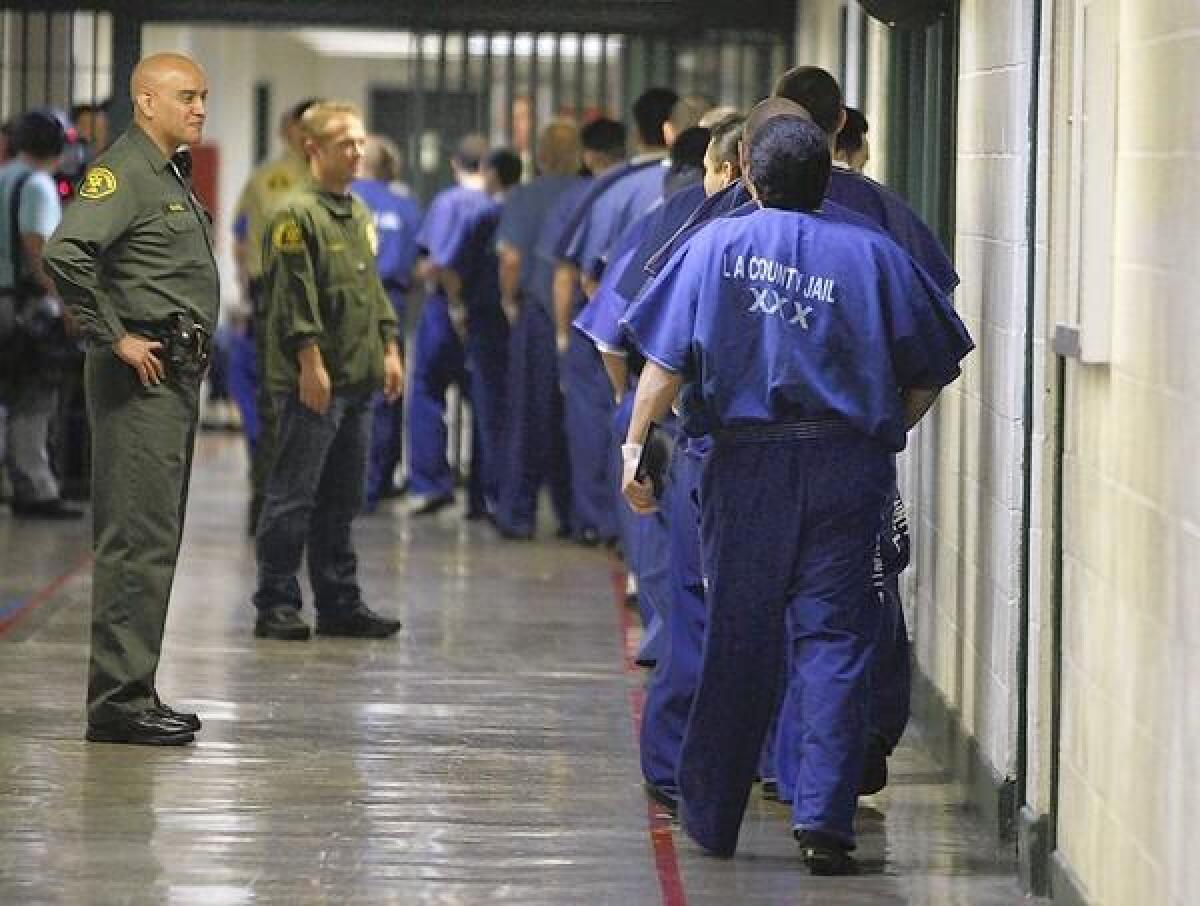
All of California’s county jails would be required to provide visits from inmate family members under legislation approved on Monday by the state Senate.
Senate Bill 1157 would force a change in as many 11 counties that have either fully switched to video conferencing or are in the process of eliminating in-person visitation.
“Without this, it means we will have incarcerated people in our jails who are not able to bond with children or family members for years,” said state Sen. Holly Mitchell (D-Los Angeles), the bill’s author.
Critics have said that existing law has allowed counties to save money by shifting to video-only visitation for inmates. During debate on the Senate floor, Mitchell said that some counties are making money by charging family members to connect long distance via closed video systems.
Republican opponents largely focused on the potential cost for counties that don’t have any in-person visitation space. But some GOP senators lashed out that SB 1157 would allow more illegal items smuggled into jails, and that jail inmates must accept the consequences of their crimes.
”That is the penalty for continuing to victimize their fellow citizens,” said state Sen. Jim Nielsen (R-Gerber).
Counties that don’t offer in-person visits and are instead moving toward video systems would have until 2022 to change their operations.
- Share via
California on guard after cyber attacks on elections databases in two states
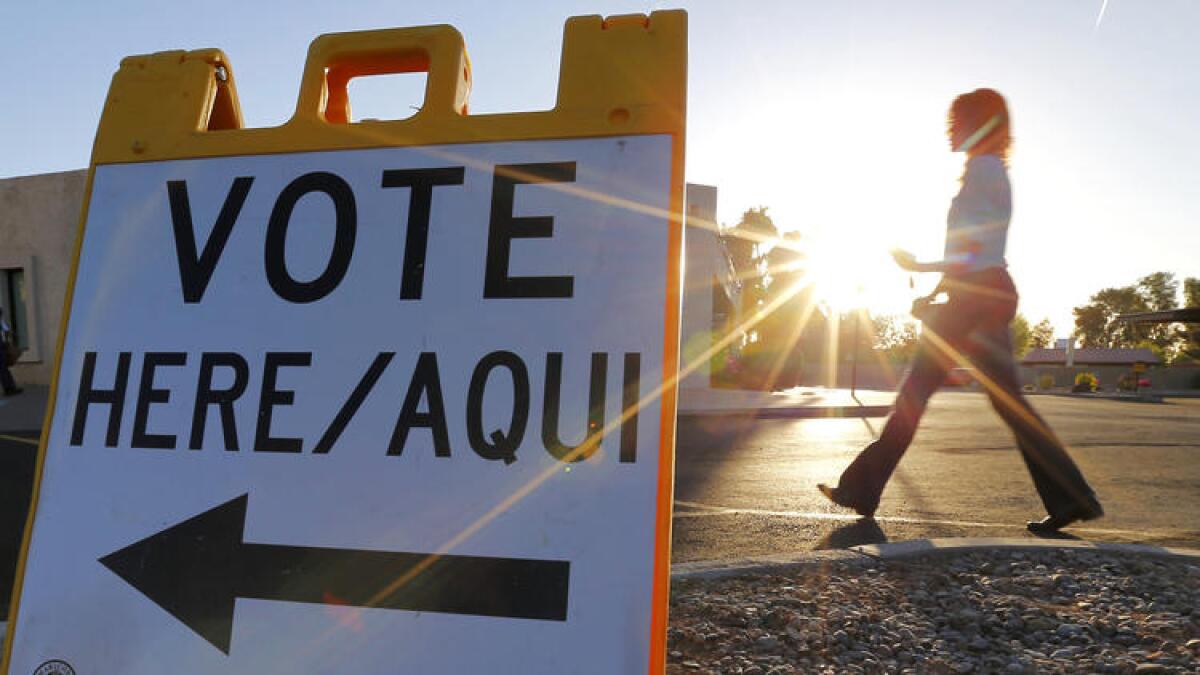
California’s elections agency announced that there is no evidence that the state’s voter registration databases had been targeted by the foreign hackers who reportedly infiltrated elections systems in Arizona and Illinois.
Yahoo News reported Monday that personal voter registration information for up to 200,000 people at the Illinois Board of Elections had been downloaded by foreign hackers.
The FBI issued an alert early this month warning state elections officials about the data breach, according to the Yahoo report.
A spokesman for California secretary of state said the agency, which oversees elections statewide, was aware of the cyber attack reports.
“We have no evidence of any breaches or hacks of our system,” agency spokesman Sam Mahood said.
Mahood declined to say whether any extra precautions are being taken, saying the agency does not disclose its security protocols.
The secretary of state’s website has been down most of Monday but Mahood said that was not caused by a hack or breach.
Unlike some other states, California counties have maintained their own databases of registered voters. However, the secretary of state’s office is in the process of centralizing voter registration information in a statewide VoteCal database, which is expected to be operational in September.
Dean Logan, registrar of voters in Los Angeles County, said the county has a cyber-security unit and outside contractors that constantly monitor all potential threats to the agency’s systems.
“I think that we just live in a time where we have to be really vigilant on this,” Logan said.
Logan emphasized the computer system that scans and counts votes is separate from the voter registration database and is not connected to the Internet or any other outside computers, insulating the system from hackers. That computer system also is housed in a secure facility, he said.
However, Logan said Los Angeles County’s voter registration database is connected to the secretary of state’s computer system, which is why the reports in Illinois and Arizona are so concerning, he said.
“We have been looking at this in conjunction with the larger political dialog about the security of elections system and with the presidential election,” Logan said.
Federal authorities already are investigating cyber attacks in June against the Democratic National Committee and another on the Democratic Congressional Campaign Committee. Federal law enforcement officials have said the hack was likely carried out by Russian intelligence agents.
The release of Democratic Party emails by WikiLeaks just ahead of July’s Democratic National Convention revealed comments suggesting the party was aiding Hillary Clinton over Vermont Sen. Bernie Sanders, violating the party’s commitment of neutrality. Democratic Chairwoman Debbie Wasserman Schultz was forced to resign her post.
- Share via
Your turn to ask the U.S. Senate candidates a question
It’s been more than 2-1/2 decades since California has had an open U.S. Senate seat, and the campaigns have been very quiet this summer.
As Atty. Gen. Kamala Harris and Rep. Loretta Sanchez (D-Orange) campaign to replace Sen. Barbara Boxer, what do you want to know from the candidates?
The Times’ politics team will be posing a series of questions to the two Democrats about what they would do for the Golden State if elected to the U.S. Senate, and we want your help.
Tweet your questions to @latpoliticsCA by the end of the week and we’ll select some of the best ones to include in our candidate questionnaire.
- Share via
Do reforms to California’s energy regulator go far enough?
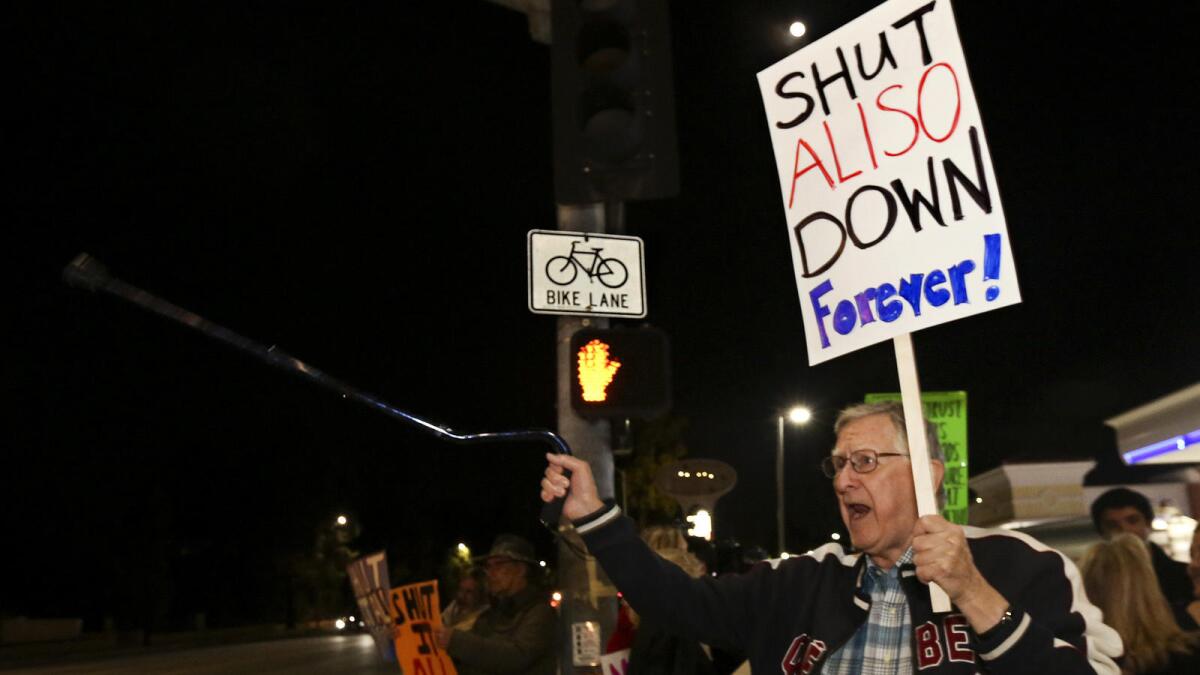
A major overhaul of California’s utility regulator is working through the Legislature with the blessing of Gov. Jerry Brown.
But some advocates and observers are worried that the efforts don’t go far enough to combat the cozy relationships between industry leaders and the California Public Utilities Commission.
Even if the new measures get implemented, energy executives will still be able to meet privately with regulators during discussions about setting electric and gas rates -- though there will be more transparency surrounding the communications.
- Share via
California Politics podcast: A climate-change deal plus a look at the Legislature’s final three days
It was on, then off, then back on again. This week, the last chapters of the summer’s climate-change agreement were finally written at the state Capitol.
On this episode of the California Politics Podcast, we examine how the deal came together and the lingering impact between factions of Democrats in the Legislature.
We also look at some of the big items left for action in the Legislature’s final few days. And we discuss the impact two longtime statehouse staffers had on decades of California public policy.
I’m joined by Marisa Lagos of KQED News and Anthony York of the Grizzly Bear Project.
- Share via
Smartphone cases that look like guns will be outlawed under bill signed by Gov. Brown
Cellphone cases made to look like guns are a new fashion trend but they may also put owners at risk, so their manufacture and sale will be outlawed in California under a bill signed Friday by Gov. Jerry Brown.
The legislation was introduced by Assemblyman Jim Cooper (D-Elk Grove) in response to concerns by law enforcement officials that the phone cases might be mistaken by police officers for a real firearm and lead to a violent confrontation.
Some of the cases have a handgun grip and trigger system.
“These devices are fairly new, and this bill takes a proactive approach to stop a problem before it happens,” said Cooper, a former captain with the Sacramento County Sheriff’s Department.
Brown previously has signed seven other gun-control bills, and he has others on his desk.
The latest bill would make it a misdemeanor to import, manufacture or sell smartphone cases that look like guns starting Jan. 1.
The bill is supported by groups including the Assn. of Orange County Deputy Sheriffs, the California Assn. of Highway Patrolmen, the California Police Chiefs Assn. and the California State Sheriffs’ Assn.
- Share via
Gov. Brown signs bill to block state funding of coal terminals
Gov. Jerry Brown signed legislation Friday that prohibits the California Transportation Commission from providing money for any new bulk-coal terminals in the state, and he urged cities with ports to take action to reduce such shipments.
“I believe action on multiple fronts will be necessary to transition away from coal,” Brown wrote in a signing message. “In California, we’re divesting from thermal coal in our state pensions, shifting to renewable energy, and last year coal exports from California ports declined by more than one-third, from 4.65 million to 2.96 million tons. That’s a positive trend we need to build on.”
State Sen. Loni Hancock (D-Berkeley) authored the bill, which was signed even as Brown noted that the city of Oakland has documented the health, safety and climate effects of coal and banned its shipment through the city.
“Other localities should follow suit — and the state should, too — to reduce, and ultimately, eliminate the shipment of coal through all California ports,” Brown wrote. “That’s why I’m signing SB 1279 and why I will continue to work with the Legislature on further actions to curb coal and combat climate change.”
The bill is opposed by groups including the California Teamsters Public Affairs Council, the California Trade Coalition and the League of California Cities. Opponents said the measure might violate U.S. treaty obligations and commerce laws because it singles out one commodity.
- Share via
Hollywood skyscrapers and other large L.A. developments could get fast-tracked under law signed Friday
Four proposed mega-projects in Los Angeles could be fast-tracked under a new law signed by Gov. Jerry Brown on Friday.
The measure aims to speed up any lawsuits under the state’s primary environmental law governing development against large projects that also pay high construction wages and meet certain greenhouse gas and renewable energy standards.
The new law, authored by state Sen. Cathleen Galgiani (D-Stockton), applies across the state. And proponents of four projects in Los Angeles have already said they plan to apply for the benefit.
The law says that environmental lawsuits against the projects shouldn’t take longer than nine months to complete, something that the Los Angeles developers believe could get their projects off the ground three years faster than they would otherwise. Here are the four projects that plan to apply:
- A $1-billion redevelopment of the Crossroads of the World complex in Hollywood
- A $200-million hotel and residential development at the corner of Yucca Street and Argyle Avenue in Hollywood
- The redevelopment of Barlow Respiratory Hospital near Dodger Stadium that would add 400 single-family homes to the property
- A $1-billion park created by capping 38 acres of U.S. Highway 101 between Hollywood and Santa Monica boulevards
Opponents of the law had questioned whether the environmental provisions were strong enough to allow for streamlined review in the courts.
It also remains to be seen how much the law will help the projects. None of the six that qualified under a previous version of the law has so far successfully used its provisions to go through court faster.
The new law takes effect immediately.
- Share via
Santa Ana police officers switch to ‘dual endorsement,’ now support Loretta Sanchez and Kamala Harris for Senate
- Share via
California women could soon pick up a year’s worth of birth control pills at once
California women could receive a year’s worth of birth control pills at once under a bill sent to the governor Friday.
The state currently prevents pharmacists from dispensing more than three months’ worth of oral contraceptives at one time. Most women pick up their birth control prescriptions every month or every three months.
The bill’s supporters say allowing women to pick up more pills at once will help prevent unintended pregnancy, especially in rural areas where women must travel long distances to visit a pharmacy.
- Share via
No more killer whales: Legislature sends measure banning orca breeding and performances in California to governor
California theme parks would be banned from breeding orcas or featuring them in performances for entertainment purposes under a bill the state Senate sent to Gov. Jerry Brown on Friday.
SeaWorld, the park featured in the critical 2013 documentary “Blackfish,” announced in March that it would stop breeding orcas.
The legislation passed Friday would prevent theme parks and other organizations in California from starting similar breeding programs in the future. The bill needs the governor’s signature to take effect.
The orca provision is part of a budget-related bill that would be wrapped into the $171-billion state budget the governor signed in June.
- Share via
Lawmakers push school bus safety bill after fatality
Nearly a year after a special needs student died in Whittier after being left in a sweltering bus parked with its windows closed, state lawmakers on Friday sent the governor a bill that would require new safety steps for school bus drivers.
Sen. Tony Mendoza (D-Artesia) named his bill after Hun Joon “Paul” Lee, 19, a student at Sierra Adult School who could not verbally communicate and needed special care.
“No parent should fear that their child will not return home safely at the end of the day,” Mendoza said. “My hope is that SB 1072 will prevent future tragedies by requiring every school bus in the state to be equipped with a child-safety alarm system.”
The measure requires school buses, youth buses and child care motor vehicles to be equipped by the 2018-19 school year with alert systems that force drivers to manually disarm or scan an alarm at the rear of the bus before exiting the bus.
The bill also requires school districts to improve the training of drivers to avoid students being left on buses alone and requires notification of the Department of Motor Vehicles of some incidents involving students being left behind.
- Share via
House Democrats join Clinton’s ‘alt-right’ message targeting GOP
For months House Democrats have been attempting to tie down-ballot Republican opponents to the controversial statements of Donald Trump.
Now Democrats have a new campaign bogeyman around which to build their attacks after Democratic presidential nominee Hillary Clinton opened a sharp line of attack in a speech Thursday: the so-called “alternative right” or “alt-right.”
In her remarks, Clinton accused Trump of “taking hate groups mainstream” and referred to the alt-right as a “racist ideology.”
So what is the alt-right? Different things to different people, or as The Times’ Evan Halper puts it: “a loosely organized network of anti-establishment activists on the right that helped fuel the GOP nominee’s rise.”
Regardless, it did not take long for Democrats on Thursday to pick up on the new line of attack.
The Democratic Congressional Campaign Committee pounced on an op-ed whose author said he is a volunteer for first-term Republican Rep. Steve Knight, who is in a tight reelection fight against Democrat Bryan Caforio in California’s 25th District.
“I have seen the power of the new ‘alternative right’ movement, and this is the future I want to see for our country,” the op-ed says.
While the Democratic campaign committee criticized what it called “Knight’s acceptance of alt-right members as part of his campaign,” Knight’s campaign manager, Katie Varner, said the author of the op-ed “is not and has never been a member of Knight for Congress Campaign Staff.”
Knight, she said, “speaks for himself.”
Here is a sampling of reporting and commentary on the alt-right from The Times’ David Horsey, the Washington Post, Buzzfeed and Breitbart.
- Share via
California would build database of violent deaths under bill sent to governor
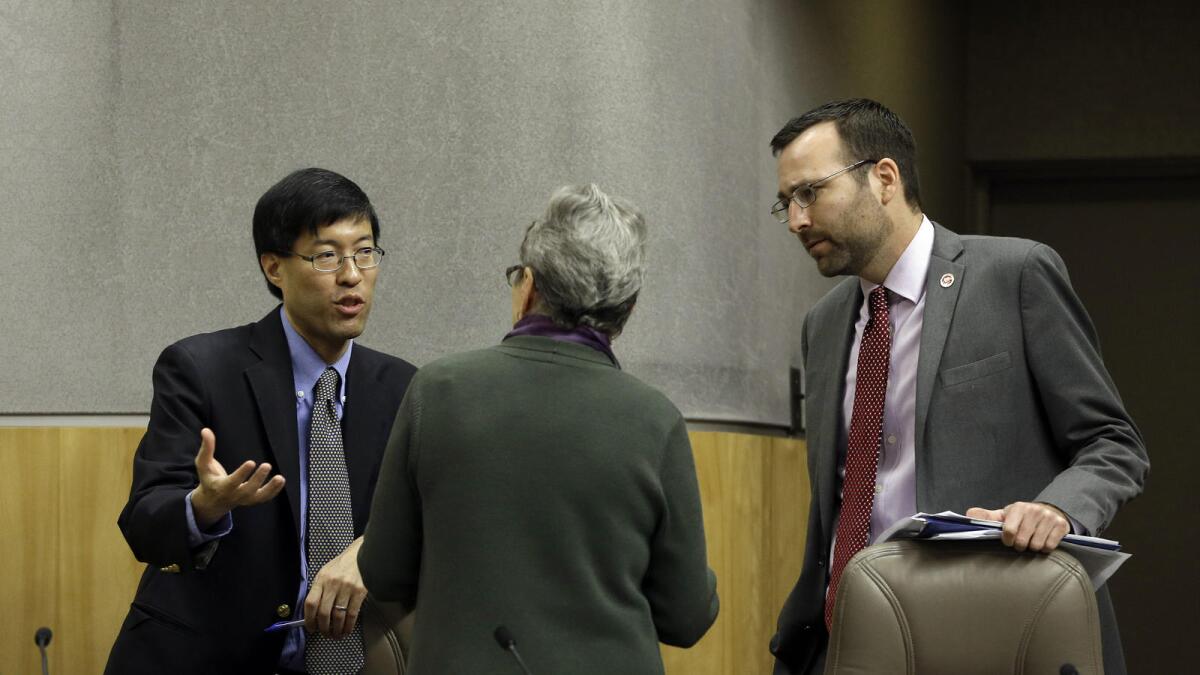
Californians might soon be able to look up data on violent deaths in the state if the governor signs a bill the state Senate sent him Thursday.
SB 877, authored by state Sen. Richard Pan (D-Sacramento), would require the Department of Public Health to collect data on violent deaths in the state, including shooting deaths, homicides and suicides.
The department would have to publish a summary and analysis of the data online.
The aggregate data would be public, but individual identifying information about the people involved in such deaths would be confidential.
From 2005 to 2010, California was part of a national violent death reporting project by the Centers for Disease Control and Prevention. The CDC has since stopped funding the project in California.
SB 877 would allow California to apply for CDC grants to help fund the statewide project.
- Share via
Protections against race-based wage discrimination could grow stronger under bill sent to governor
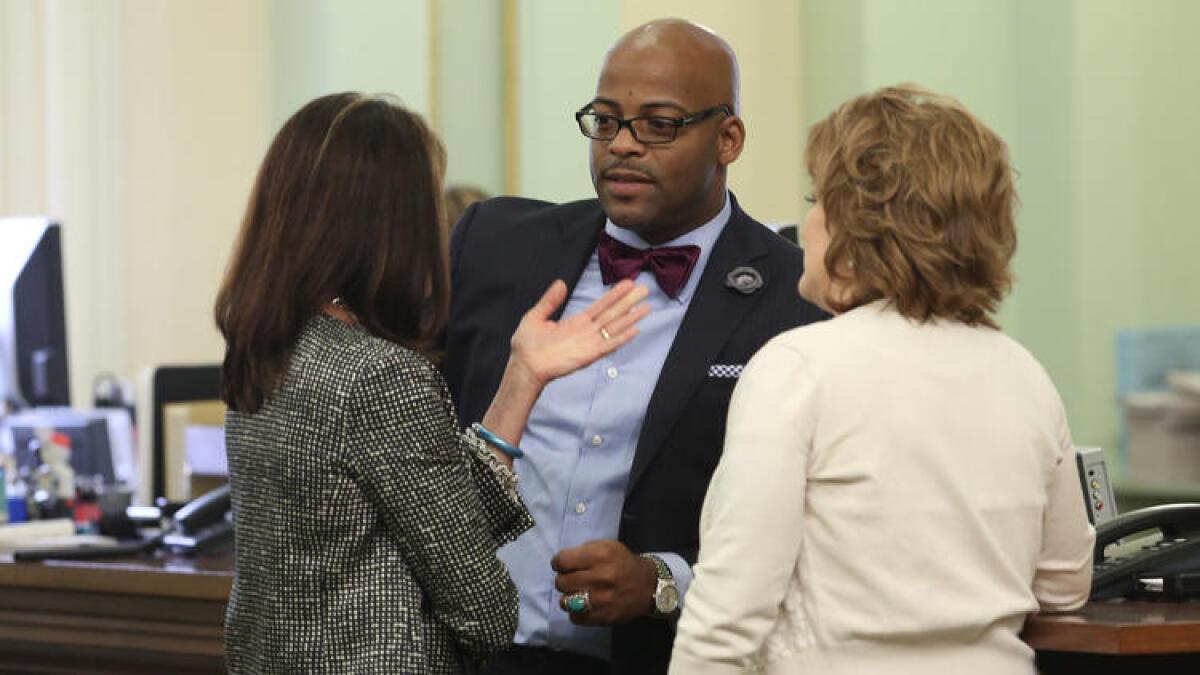
Employers in California would be prohibited from paying lower wages for similar work because of an employee’s race or ethnicity under a bill sent to the governor Thursday.
The bill, SB 1063, would strengthen existing protections against race-based wage discrimination.
It would amend the state’s Equal Pay Act to prevent employers from paying workers doing “substantially similar work” different wages based on their race or ethnicity even if they have different titles or work at different sites.
Studies have shown people of color on average make less than their white counterparts, said the bill’s author, state Sen. Isadore Hall III (D-Compton), adding the legislation “will put California at the forefront of fighting wage equality.”
California enacted a similar bill last year strengthening laws banning gender-based wage discrimination.
- Share via
GOP wants seat at the table to oversee state air board
The California Air Resources Board has been the target of stinging criticism from Democratic legislators — in increasingly pointed rhetoric of race and class — but Assembly GOP leader Chad Mayes wants to make sure the minority party also has a role in keeping tabs on the agency.
Mayes, who represents Yucca Valley, wrote a letter to Assembly Speaker Anthony Rendon (D-Paramount) on Thursday requesting that at least one Republican be appointed to a joint legislative committee that would review California’s climate policies, which is meant to serve as a check on the powerful executive agency.
Earlier this week, lawmakers approved a bill that would include impose various oversight measures on the agency, including creating the legislative panel, adding two members of the Legislature as non-voting members to the board, and requiring board members to be reappointed after six years. Gov. Jerry Brown indicated he plans to sign the bill, AB 197, along with a companion climate measure, SB 32.
Mayes did not vote for the oversight measure, nor did most Republicans. Only two GOP members — Assemblymembers David Hadley of Manhattan Beach and Brian Dahle of Bieber — backed the bill.
“While I believe that AB 197 does not go far enough to reign in the unelected bureaucrats at CARB, it is a step towards imposing accountability,” Mayes wrote. “That is a good thing. For the new committee’s oversight role to have any legitimacy, however, it needs to be more than a one-party rubber stamp for the Board’s edicts.”
The legislative committee would consist of at least three assembly members and three senators. The bill makes no reference to the political party make-up of the panel.
- Share via
Governor to consider banning smoking near youth sports events
Having already signed several anti-tobacco bills this year, Gov. Jerry Brown will also get to decide whether to ban smoking within 250 feet of Little League baseball games and other youth sports events.
The latest bill was approved Thursday by the state Senate and sent to Brown, who previously raised the smoking age to 21 and designated electronic cigarettes as tobacco products subject to bans on use in restaurants and other public places where smoking is banned.
The new proposal is by Sen. Richard Pan (D-Sacramento), a pediatrician, who said youth sports events are meant to promote healthy living, which is undermined by smoking. He also said secondhand smoke is a health risk.
“This is a measure to protect our public health,” said Pan, whose SB 977 also applies to electronic cigarettes.
- Share via
Bill requiring ignition-lock devices for DUI offenders sent to governor
Californians convicted of driving under the influence may have to install a device in their cars that would ensure they are sober before they can start the ignition.
Under a bill the California Senate sent to the governor Thursday, DUI offenders would have to equip their vehicles with ignition interlock devices to have their licenses reinstated or to obtain a restricted license.
The devices, which can detect alcohol on a person’s breath, require drivers to breathe into them to prove they are sober before they can start their vehicle.
If the governor signs the bill, SB 1046, it would take effect in 2019.
Los Angeles County already requires DUI offenders to install ignition interlock devices in their cars as part of a pilot program also in place in Sacramento, Alameda and Tulare counties.
In those counties, first-time DUI offenders must use the device for five months. Subsequent offenses require drivers to use the devices for longer periods of time.
California law already allows people convicted of DUIs to apply for restricted licenses or to have their licenses reinstated.
- Share via
Assemblywoman Cheryl Brown gets warning letter for not reporting asset transfer
The state’s ethics watchdog agency has issued a warning letter to state Assemblywoman Cheryl Brown (D-San Bernardino) for violating a requirement to report the disposal of a personal asset, officials said Thursday.
The Enforcement Division of the Fair Political Practices Commission launched an investigation after receiving a complaint that alleged Brown reported a business entity that raised concern about a potential conflict of interest.
“Specifically, we found that in 2012, you transferred ownership of your business Brown Publishing LLC to an adult child but erroneously continued to report that economic interest” on an annual statement of economic interests, write Galena West, chief of the Enforcement Division of the FPPC, in the letter.
Elected officials are required to report when they dispose of an asset, according to the Political Reform Act.
“Your actions violated the Act because you continued to report an interest in Brown Publishing on a subsequent annual statement,” West wrote. Because Brown later corrected her public documents “we are closing this matter,” West wrote.
Brown is locked into a tough reelection contest.
- Share via
Emotions flare over legislation to expand overtime pay for California farmworkers
Tensions flared at the state Capitol on Thursday after the state Assembly abruptly adjourned without taking up its most anticipated piece of legislation of the day: a bill that would expand overtime pay for thousands of California farmworkers.
Another showdown over AB 1066, a bill authored by Assemblywoman Lorena Gonzalez (D-San Diego), had been expected in the lower house after a similar proposal died in June four votes short of the majority it needed to pass.
But lawmakers said they would wait until Monday to keep working with members to garner the support. The lack of action on Thursday suggested they were having trouble mustering up the votes needed for it to pass.
Leaders with the United Farm Workers of America initially exchanged terse words with Assemblyman Eduardo Garcia (D-Coachella) outside the chambers over the decision to wait.
“We are on the same team,” Garcia assured them, as labor leaders said dozens of farmworkers had given up their time and wages to be at the Capitol for the vote. “At the end of the day we are all trying to make sure this happens. We are going to get the 41 votes.”
Gonzalez later met privately with more than 10 members of the labor union, as dozens of farmworkers waited outside, singing songs and chanting for about an hour, “Sí Se Puede” and “Overtime.”
Assembly Speaker Anthony Rendon then addressed the crowd, assuring farmworkers that legislators would take up the issue next week.
“I will do everything in my power to make sure this passes next week,” Rendon said. “In this building we talk about how California is ahead of the game. We talk about how California is ahead of the world. But we are not as long as we are not paying farmworkers overtime.”
On their respective house floors, Rendon and Senate President Pro Tem Kevin de León have given passionate speeches, urging lawmakers to support the legislation.
The United Farm Workers association, which sponsored it, argues the legislation addresses an injustice farmworkers have lived with since they were first exempted from federal minimum wage and overtime standards nearly eight decades ago.
But prominent business groups, led by the California Farm Bureau Federation and a coalition of agricultural producers, have thrown their political weight against it, saying the legislation saddles farmers and growers with higher costs.
“If overtime rules change, farmers would likely adjust work schedules to avoid overtime or take other actions, such as reducing acreage, switching crops or looking for machines that can replace people,” said Dave Kranz, a spokesman from the California Farm Bureau Federation. “In any of those scenarios, unfortunately, employees would lose work hours.”
The proposal would roll out new rules for overtime in 2019, lowering the current 10-hour-day threshold for overtime by half an hour each year until it reaches the standard eight-hour day by 2022. It also would phase in a 40-hour standard workweek for the first time.
Before the vote, nearly 250 farmworkers gathered on the south steps of Capitol. They came from the Central Valley and Napa and Sonoma counties, where they harvest grapes and tree fruit, to the Central Coast, where they fill baskets of strawberries, vegetables and mushrooms.
UFW president Arturo Rodríguez said the workers had sacrificed a day’s wages to lobby in support of the bill.
Sylvia Huerta, 70, said she and her two friends woke up at 3 a.m. to feed their children and board the bus to Sacramento at the crack of dawn. They have worked in the fields for more than 20 years, picking lettuce and broccoli, she said, and rarely if ever receive any overtime under the state’s limited laws.
“It is hard on women like us, mothers and workers,” she said.
- Share via
California agency drops probe of former state Sen. Ron Calderon
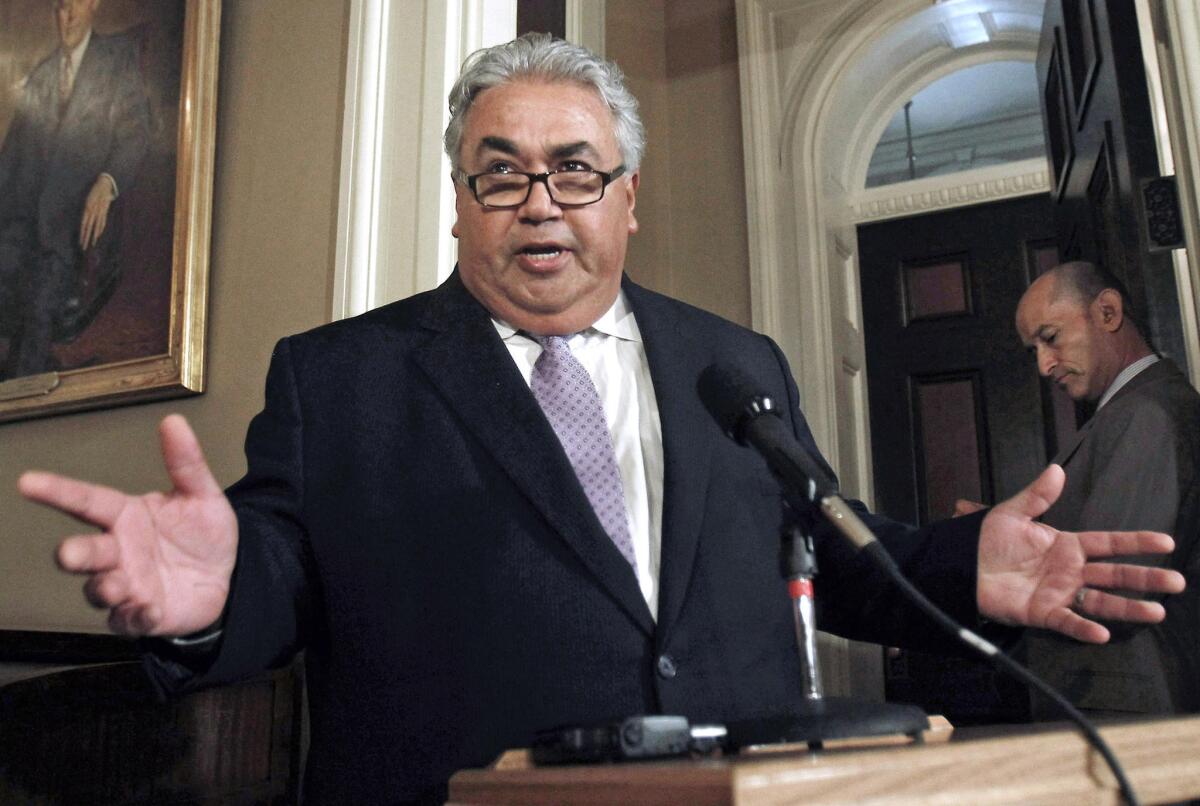
With former state Sen. Ronald Calderon having pleaded guilty to federal corruption charges in June, the state’s campaign finance watchdog agency said Thursday that it is dropping its investigation into whether he violated political finance rules.
The state Fair Political Practices Commission had been involved in an administrative investigation into whether Calderon had improperly requested a donation to a charity in addition to campaign finance violations, according to Dave Bainbridge, an assistant chief of the agency’s enforcement division.
“In light of Mr. Calderon’s recent guilty plea to federal criminal charges, the commission is closing this matter without further action,” Bainbridge wrote to Calderon’s attorney, Mark Geragos.
Calderon pleaded guilty on June 13 to mail fraud, conceding he accepted tens of thousands of dollars in bribes from undercover FBI agents and a hospital executive.
Calderon faces sentencing in the federal case on Sept. 19.
- Share via
Bill to increase transparency of contacts between state energy regulators and utilities heads to Gov. Jerry Brown
- Share via
Developer incentive to build low-income housing passes state Senate
A measure to expand incentives for developers who agree to build low-income housing cleared the state Senate on Thursday.
The bill from Assemblyman Richard Bloom (D-Santa Monica) strengthens the state’s rules requiring local governments to approve housing projects that allow developers to build at higher densities, have lower parking requirements or receive other concessions if they reserve a portion of their projects for low-income residents. Bloom contends that local governments use ambiguities in the law to stall projects that otherwise should be approved.
The measure sparked some debate, with Democratic Sen. Mark Leno noting that community groups in his hometown of San Francisco had opposed the effort, arguing it undermined local policies.
“Beware of one-sized-fits-all land-use proposals,” Leno said.
Sen. Ben Allen (D-Santa Monica) who presented the bill on Bloom’s behalf, countered that it would help the state’s problems with rising housing prices.
“This is a bill that does merit support, given the serious housing crisis we have statewide,” Allen said.
The measure now returns to the Assembly for a vote on changes made in the Senate. It’s one of three bills Gov. Jerry Brown endorsed in May as part of a legislative package to increase housing supply as a way to reduce costs.
Brown’s own plan to streamline approval for housing projects, which would have made larger changes to local rules governing housing, failed to get support in the Legislature and is no longer under consideration this year.
- Share via
Waste, ethics violations by state workers uncovered by auditor
The state auditor on Thursday blasted various California agencies for ethics violations and wasteful practices, including the failure to collect nearly $315,000 in rent and utilities over five years from tenants of a mobile home park owned by Caltrans.
Auditor Elaine Howle issues reports twice a year on improper activity found by investigations her office conducts.
“Through our investigations, we found conflict of interest, violation of post‑employment ethics restrictions, waste of state funds, misuse of state resources, and activities incompatible with state employment,” Howle wrote to Gov. Jerry Brown. “In total, we identified $397,000 in gifts not disclosed and in wasted funds related to improper travel expenses and mismanagement.”
The report found that the California Department of Transportation failed to properly manage a San Joaquin Valley mobile home park that it purchased in late 2010.
Caltrans Director Malcolm Dougherty has assigned a new agent to the project and reminded employees of proper procedures.
“The information brought to light by the State Auditor does not reflect the mission, vision and goals of the Department of Transportation, and as a department I have taken immediate and decisive corrective actions to improve our performance,” he said in a statement
Auditors also found:
— A district engineer for the State Water Resources Control Board violated conflict-of-interest law by repeatedly recommending that the state’s drinking water program enter into funding agreements with an engineering firm that employed the district engineer’s spouse, and by approving the engineering firm’s claims for payment. The firm received $3.9 million.
— A peace officer supervisor working for the Department of Parks and Recreation improperly accepted a gift of 24 pairs of designer sunglasses valued at $4,800 from a vendor that did business with the state.
— The Department of Public Health wasted $74,200 in state funds by inappropriately reimbursing the commuting expenses of an official from the official’s home in Sonoma County to headquarters in Sacramento.
- Share via
After opposition from Mayor Eric Garcetti and others, bill to restructure L.A. County MTA is shelved for year
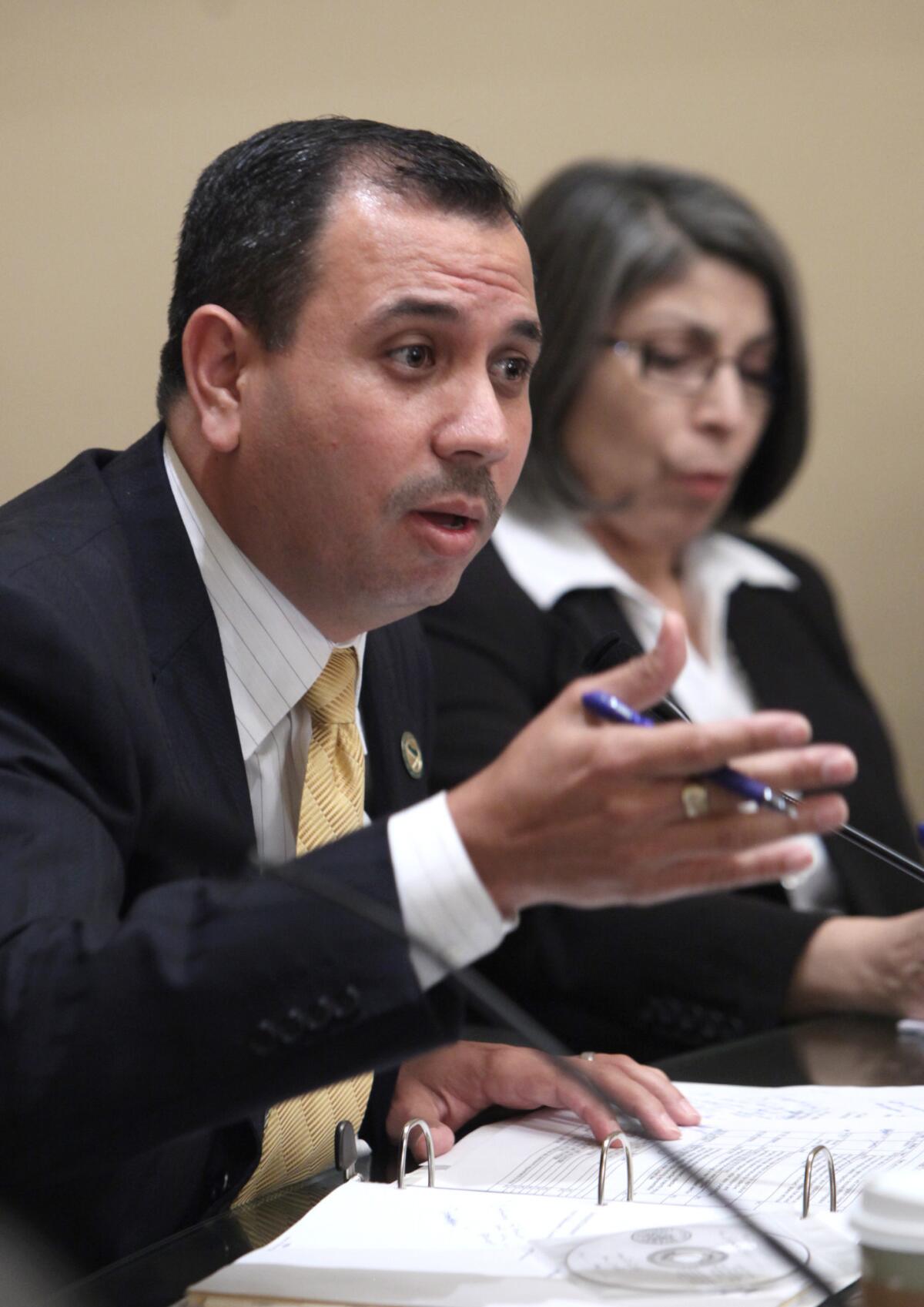
Facing growing opposition from the political establishment, a state lawmaker has dropped a bill for the year that would have reorganized the Los Angeles County Metropolitan Transportation Authority Board to give more voice to the dozens of small cities in the county.
Sen. Tony Mendoza (D-Artesia) had complained that 87 cities other than Los Angels have 52% of the county’s population but only 31% of the MTA’s board members, which he says means they are not getting their fair share of projects.
His bill would have reconfigured the board by reducing from five to two the number of members appointed by the county Board of Supervisors and reducing from two to one the number of public members appointed by the mayor of Los Angeles.
Mendoza proposed to add the mayor of Long Beach to the board as well as one mayor or city council member appointed by the Assembly speaker and additional city officials selected by a committee representing smaller cities.
The bill’s opponents included the Central City Assn., the county of Los Angeles, Los Angeles Mayor Eric Garcetti, the State Building and Construction Trades Council and the Metro board of directors.
“Even though my bill has broad support of elected officials from cities throughout Los Angeles County, I believe it is in the best interest of all stakeholders that we continue to work toward a bipartisan effort that will benefit every resident in our region,” Mendoza said in a statement
“My goal continues to be to improve the governance of the Los Angeles County Metropolitan Transportation Authority by restructuring its membership so that it represents all of Los Angeles’ diverse citizens and interests,” he added. “Today this is not the case, but I remain committed to accomplishing this goal.”
- Share via
Gregory Schmidt, longtime secretary of the California Senate, dies at 69
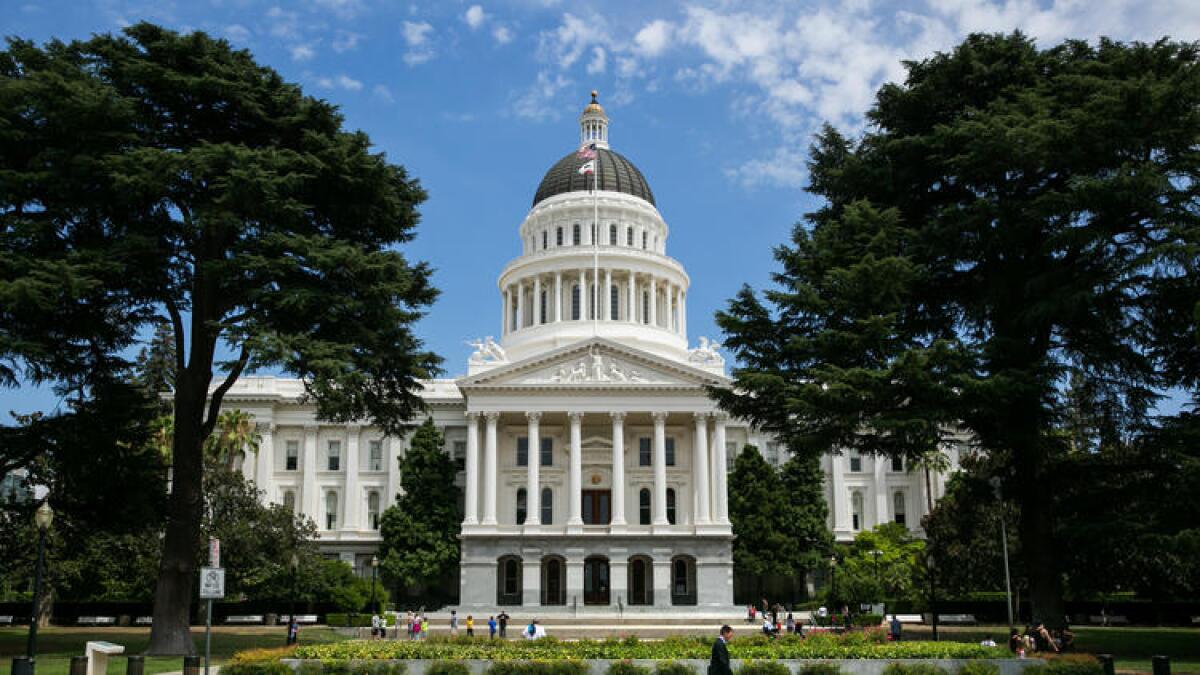
Gregory Schmidt, who served for 18 years as the secretary of the California state Senate before retiring two years ago, died Wednesday.
He was 69.
“For over a decade, Greg was the highest ranking staffer in the Senate, but he was always humble,” said Senate President Pro Tem Kevin de León (D-Los Angeles). “He never forgot that all of us were just regular people who worked for all the people of California.”
De León’s office said Schmidt died after a brief battle with cancer.
Schmidt was a veteran legislative staffer, and as Senate secretary served as the upper house’s chief parliamentarian. A top aide who stayed out of the public eye, he served under four different Democrats who led the Senate. Before that, he was a chief consultant to the Senate Judiciary Committee and the Assembly’s Human Services Committee. He began his political career as a volunteer in Democratic politics, having also spent a year in seminary school.
Schmidt’s 2014 retirement came after a series of high-profile controversies involving both the conduct of three senators and accusations of nepotism in the hiring of Senate staff. He was replaced by the current Senate secretary, Daniel Alvarez.
The Senate is expected to honor Schmidt on Thursday morning in its regular floor session.
- Share via
Sex offenders would have to disclose email addresses and usernames under bill sent to governor

Sex offenders would be required to report their email addresses, usernames and other Internet identifiers to law enforcement under a bill California state senators sent to the governor Wednesday.
The bill, SB 448, would amend parts of California law enacted when voters passed anti sex-trafficking law Proposition 35 that have since been challenged in court. The bill now goes to the governor.
SB 448 would apply to offenders convicted on or after Jan. 1, 2017 who used the Internet to carry out sex crimes.
Proposition 35 passed by statewide ballot in 2012 with more than 80 percent of the vote. It increased punishments for human traffickers and expanded the definition of human trafficking to include the creation and distribution of child pornography.
In 2014, a federal court sided with the American Civil Liberties Union and the Electronic Frontier Foundation, which had challenged that parts of Prop. 35 violated sex offenders’ constitutional rights. The judge in the case gave California until the end of this year to fix flaws the court found in the law.
- Share via
California could decriminalize prostitution if Gov. Jerry Brown signs these two bills
The state Assembly on Wednesday took bold steps to decriminalize prostitution, sending two controversial bills to Gov. Jerry Brown that supporters say would protect victims trafficked in the sex industry.
SB 1322 and SB 1129 drew the support of a large coalition of advocates who said the bills diverted victims away from the criminal justice system and provided a better path to social services for children and teens forced into prostitution.
But opponents argued the bills made it difficult for authorities to go after buyers and sellers in the sex trade. Vulnerable children, they said, often don’t see themselves as victims, run away from unsecured shelters and remain tied to their traffickers through complicated psychological and emotional bonds.
Legislation to curb human trafficking has been a prominent issue at the state Capitol this session, as prosecutors and advocates have pushed the issue to the political forefront. Most of the proposals have focused on the trade of forced sex and reflect a cultural shift in the approach to prostitution that aims to treat people forced into the business like victims, not criminals.
- Share via
Gov. Jerry Brown hails sweeping climate legislation, plans to sign both measures into law
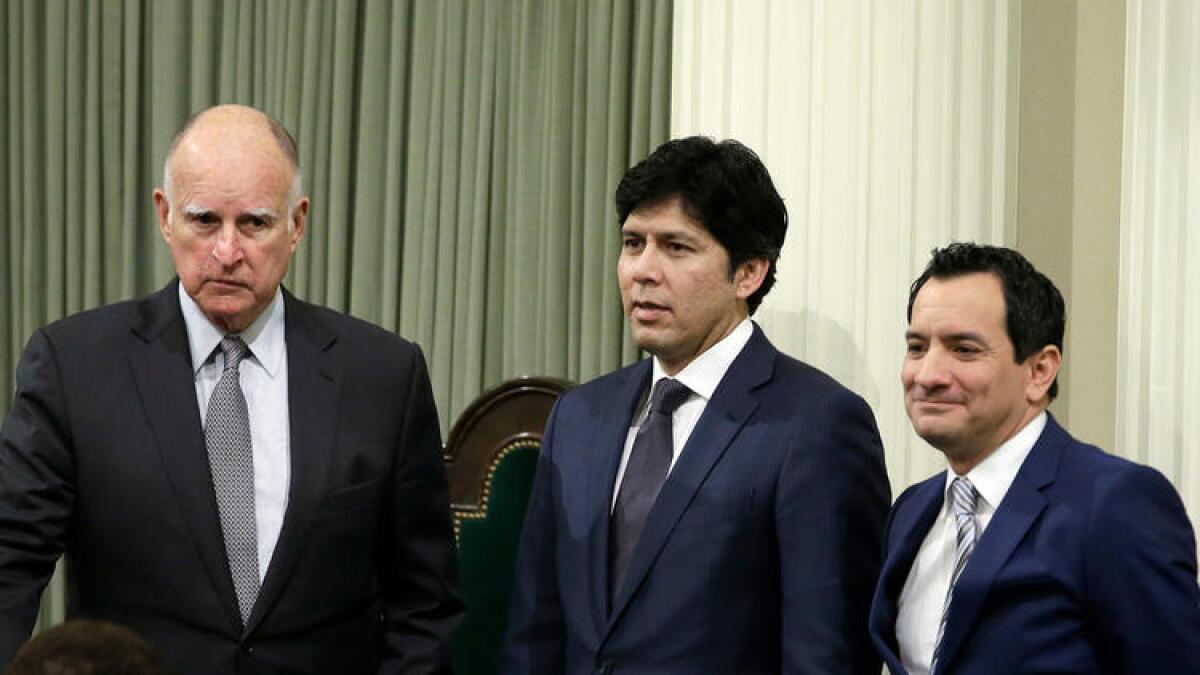
Flanked by legislative leaders, Gov. Jerry Brown said new measures approved on Wednesday would be a milestone for the state’s climate change policies.
“This is a real commitment backed up by real power,” he said during a Capitol news conference.
Brown and top lawmakers spoke with reporters shortly after the Legislature gave their final stamp of approval to the two bills, a stark change in fortune after they appeared to lack the necessary support earlier this month. The governor has said he plans to sign the bills.
Senate Bill 32, sponsored by Sen. Fran Pavley (D-Agoura Hills), would extend and expand California’s target for reducing greenhouse gas emissions. The current goal is to hit 1990 levels by 2020; the new proposal would require the state to reduce emissions by an additional 40% by 2030.
Pavley, who is retiring this year because of term limits, said, “This is a great way for me to spend my last week in the Legislature.”
The second measure, Assembly Bill 197, sponsored by Assemblyman Eduardo Garcia (D-Coachella), includes a mix of proposals to increase legislative oversight of state regulators and focus their attention on disadvantaged communities.
Those issues have been emotionally charged for lawmakers, and assuaging their concerns was key to piecing together enough votes for the legislation this year.
Garcia said it was important to “make sure all communities of California are benefiting from our climate change policy.”
The legislation does not resolve all of the issues facing California’s climate programs. In particular, the measures do not address the cap-and-trade program, which is facing a lawsuit claiming the program is an unconstitutional tax.
Brown has signaled that he plans to pursue new steps to safeguard from ongoing legal uncertainty the cap-and-trade effort, which requires companies to purchase permits in order to release greenhouse gas emissions.
- Share via
Some California felons would get more time to ask for lighter punishment under bill headed to the governor’s desk
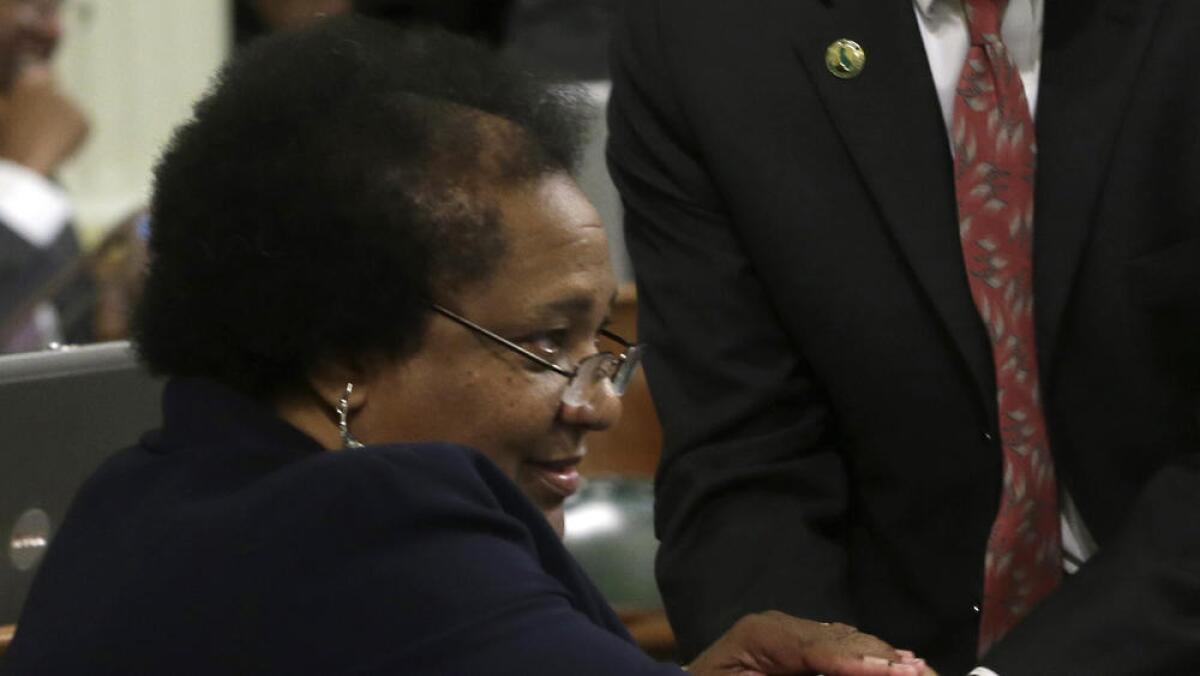
Felons eligible to reduce their punishments under a 2014 statewide ballot measure would get extra time to make that request under a bill sent to Gov. Jerry Brown on Wednesday.
The ballot measure, Proposition 47, changed some nonviolent property and drug crimes from felonies to misdemeanors, and allowed those sentenced under prior rules to ask for a shorter sentence.
But that provision ends next year, and the bill from Assemblywoman Shirley Weber (D-San Diego) would give those eligible another five years to request relief.
Prosecutors and public defenders were worried about a flood of petitions had the Legislature not acted, said Sen. Holly J. Mitchell (D-Los Angeles), who presented the bill on the Senate floor Wednesday.
“We can prevent that sort of mass filing situation from blocking our courts,” Mitchell said.
Prop. 47 remains a contentious issue, with many law enforcement groups blaming it for an increase in property crimes.
Because it changed a voter-approved ballot measure, the bill required a supermajority vote, which it cleared in the Senate Wednesday. The legislation passed the Assembly in May.
- Share via
California could soon expand the definition of rape as a result of the Stanford sexual assault case
California lawmakers have sent a bill to the governor’s desk that would expand the legal definition of rape so it includes all forms of nonconsensual sexual assault.
Assemblywomen Cristina Garcia (D-Bell Gardens) and Susan Talamantes Eggman (D-Stockton) introduced the bill to toughen consequences for sexual offenders after a Stanford University swimmer was sentenced to six months in jail for sexually assaulting an unconscious woman, sparking an outcry.
The law would allow a judge to consider the definition of rape in the sentencing phase of a case. The expanded definition also allows victims more access to to social services.
It cleared the state Assembly with a vote of 73-0.
Rape is currently defined under California law as “an act of sexual intercourse,” or penile penetration. Other types of sexual assault— including sexual penetration by a foreign object and sodomy — are categorized as separate offenses.
Supporters of the bill said it addressed a bias against lesbian, gay, bisexual, transgender and queer victims, who are not afforded the same protections as heterosexuals, though statistics show they are more likely to be victims of sexual violence. According to the Human Rights Campaign, 40% of gay men and 47% of bisexual men have experienced sexual violence other than rape as defined by California law, compared with 21% of heterosexual men.
On the Assembly floor Wednesday, lawmakers said the first step to ending rape is calling sexual assault what it is.
“California’s restrictive definition of rape means a man cannot be raped,” Garcia said. “It means a victim forced to engage in oral sex cannot be raped.”
It means that despite being sexually penetrated with an object, she has said, according to state law, the victim of the Stanford student was not raped.
- Share via
Legislation setting new target for greenhouse gas emissions sent to Gov. Jerry Brown
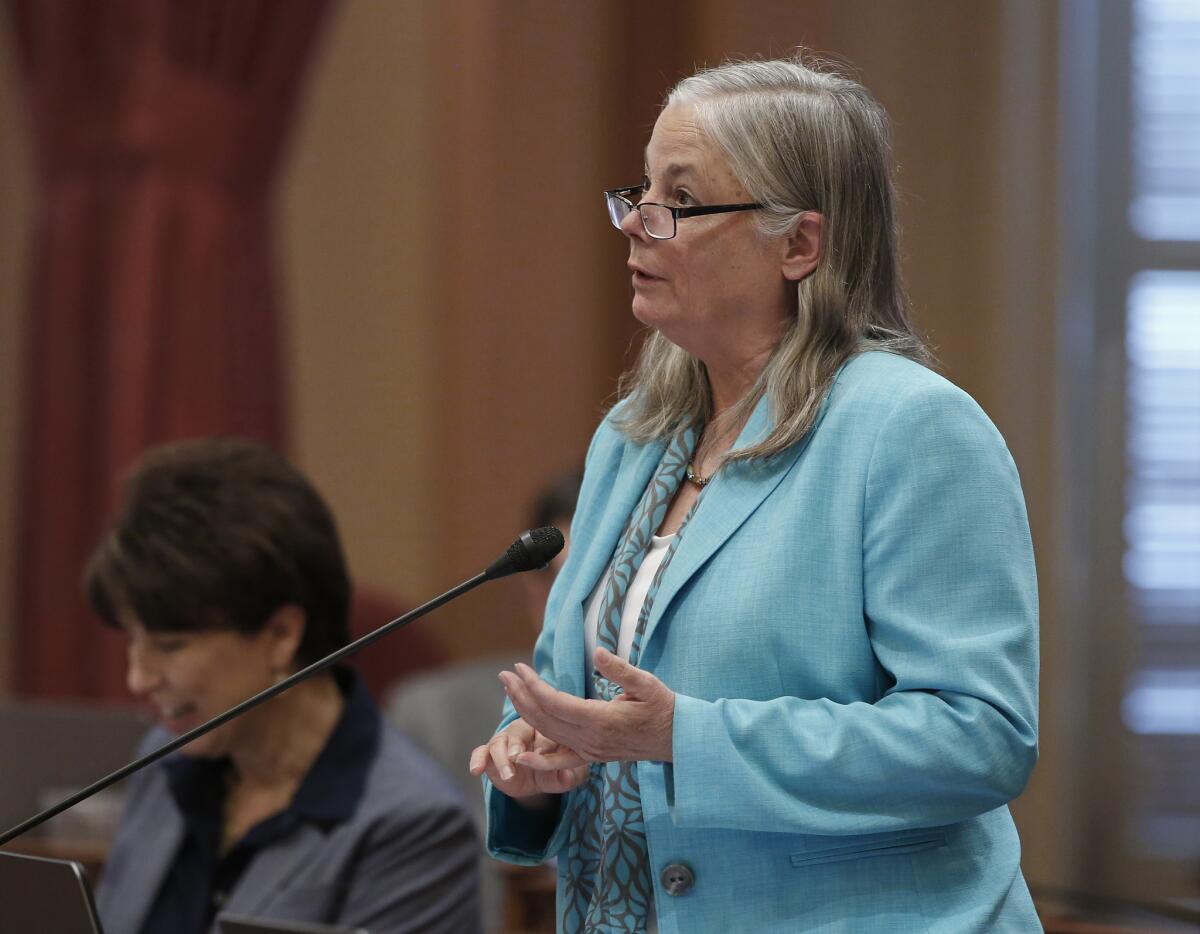
Legislation setting a more aggressive target for reducing greenhouse gas emissions was approved by the state Senate on Wednesday.
The measure, Senate Bill 32, joins Assembly Bill 197 on Gov. Jerry Brown’s desk, where they will await his signature. Brown and top lawmakers are scheduled to hold a news conference on the climate legislation on Wednesday afternoon.
Senate Bill 32 requires the state to slash emissions to 40% below 1990 levels by 2030. The current target is hitting 1990 levels by 2020, a goal the state is on track to meet.
Sen. Fran Pavley (D-Agoura Hills), who authored the legislation, said continuing California’s efforts would set an example for the rest of the world and benefit state residents.
“It has brought business, jobs and reduced greenhouse gases,” she said.
Republicans complained that the legislation would raise costs for businesses and residents.
“We won’t build anything here anymore,” Sen. Ted Gaines (R-Roseville) said. “It will just be too expensive.”
He described the measure as “a massive energy tax.”
- Share via
Sens. Dianne Feinstein and Barbara Boxer heading to Lake Tahoe with President Obama, Gov. Jerry Brown and The Killers

Next Wednesday, Sens. Dianne Feinstein and Barbara Boxer (D-Calif.) will join California Gov. Jerry Brown, President Obama and other lawmakers at the 20th Annual Lake Tahoe Summit.
The summit, which senators from Nevada and California host on a rotating basis, is hosted this year by Sen. Harry Reid (D-Nev.) in Lake Tahoe.
Reid retires in January, as does Boxer, and this year’s summit will include a performance by indie rock band The Killers and a speech from President Obama.
The summit brings local, state and federal officials together to talk about restoring and protecting Lake Tahoe.
The summit is open to the public. Tickets to The Killers’ 1:30 p.m. concert are available for $25.23 at Ticketmaster.
------------
FOR THE RECORD
Aug. 25, 3:15 p.m.: An earlier version of this post said the Tahoe Fund is a host of the event. It is a sponsor, but not a host.
------------
- Share via
Public schools could expel students for sexting and video cyberbullying under bills sent to governor

Public schools soon could expel students for bullying through video or sexting if Gov. Jerry Brown signs two bills sent to him Wednesday.
Assemblyman Ed Chau (D-Monterey Park) said he drafted AB 2536 to address increasing instances of teen sexting, in which a person sends a nude or sexually explicit photo of him or herself electronically.
It would require the California Department of Education to publish information on sexual cyberbullying online and encourage schools to teach students about sexting. It also would define “cyber sexual bullying” as sharing nude photos or videos of others “with the purpose or effect of humiliating or harassing” a student.
“The act of sexting, which some view as a normal adolescent activity, exposes teens to bullying or harassment,” Chau said in a statement. “This type of bullying has unfortunately resulted in some teenagers committing suicide, and has left schools at a loss on how to address the complex challenges it presents.”
A related bill, AB 2212 by Assemblyman Matthew Harper (R-Huntington Beach), would give public schools authority to expel students who post harassing videos.
The current definition of “bullying via an electronic act” specifically covers text messages, Internet postings, audio and photos, but does not explicitly include video.
The California Assembly passed both bills unanimously Wednesday. They now move to the governor’s desk.
- Share via
Overhaul of controversial L.A. County water board to be considered by governor
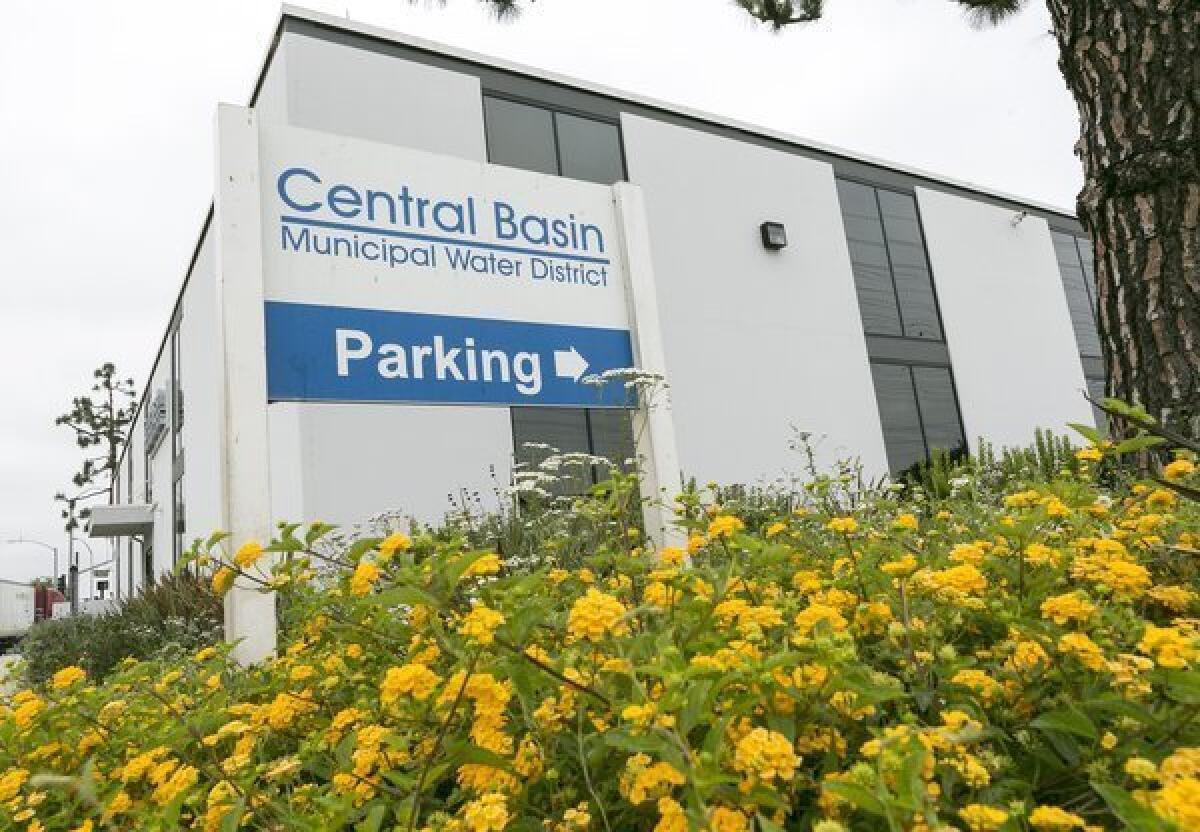
Moving to shake up a troubled agency, state lawmakers on Wednesday sent the governor a bill that would expand the board of the Central Basin Municipal Water District and change how the board’s seats are filled.
The Assembly unanimously approved a bill introduced by Assemblywoman Cristina Garcia (D-Bell Gardens) after news reports and lawsuits indicated there had been misuse of district funds and inappropriate contracting and employment practices.
District lawyers found the agency violated state law by secretly creating a $2.7-million fund for a groundwater storage project. The district also has been accused of doing favors for family members of politicians.
“It’s a district that has had a tremendous amount of public distrust,” Assembly Speaker Anthony Rendon (D-Paramount) told his colleagues Wednesday. “This will get them back on the road they need to be on.”
Garcia cited a state audit from last year that she said raised “serious ethical concerns” about district operations. The audit also found the district’s five-person board had failed to provide the leadership necessary for the district to fulfill its responsibilities to provide water to 2 million people in 24 cities and six unincorporated areas throughout southeast Los Angeles County.
“While the District has made strides to address the questions raised by the auditor report, it is important to have a governance structure that will protect consumers moving forward,” Garcia told fellow lawmakers in arguing for Assembly Bill 1794.
The measure would change the board from one of five elected members to four members elected by residents and three with technical expertise who would be appointed by water purveyors in the district beginning in 2022.
The board also would be subject to state campaign finance limits and ethics rules, and appointed directors would not be eligible to receive communication or car allowances.
The bill, Garcia said, increases accountability by balancing the input of water purveyors who are district customers with input from voters.
------------
FOR THE RECORD
Aug. 25, 12:30 a.m.: A photo previously with this post showed the former headquarters of the Central Basin Municipal Water District.